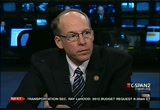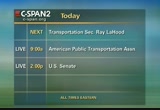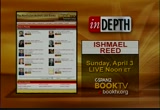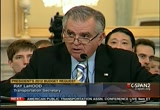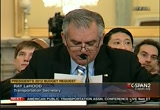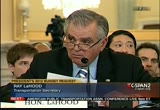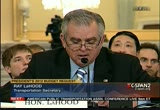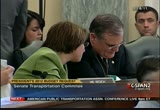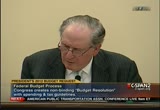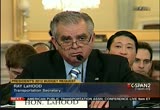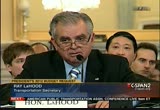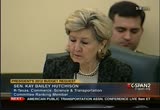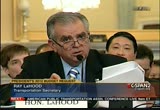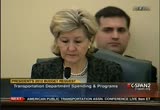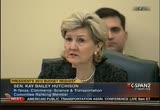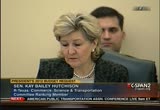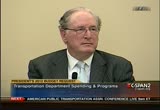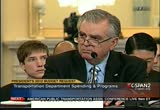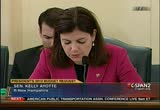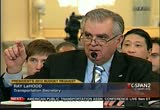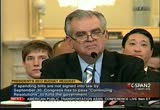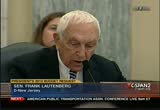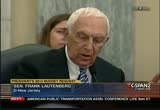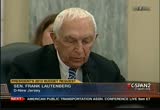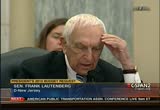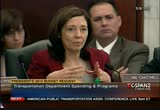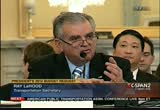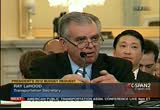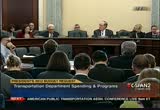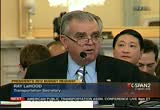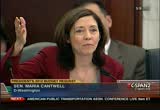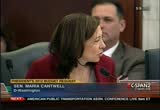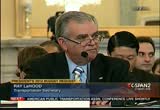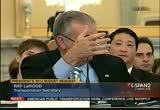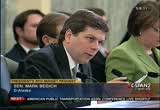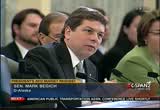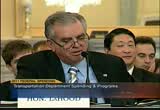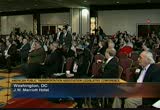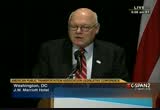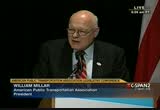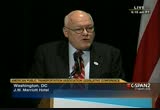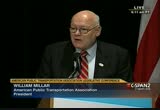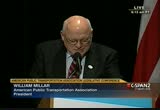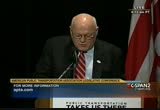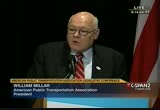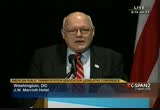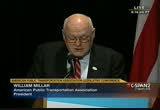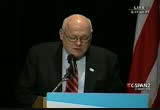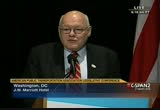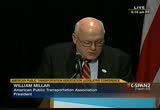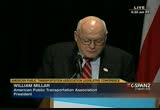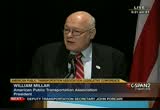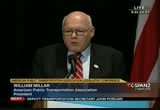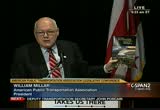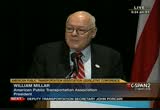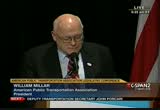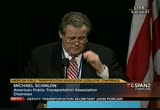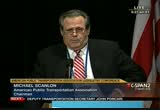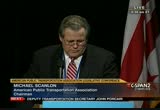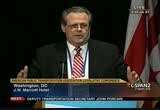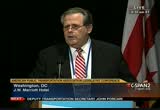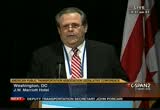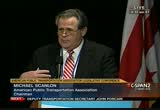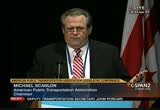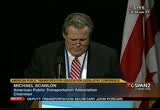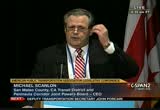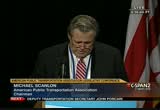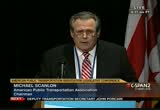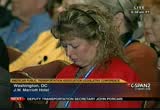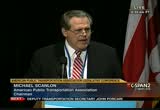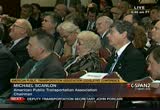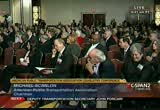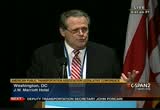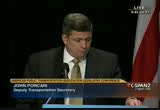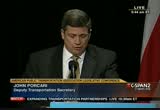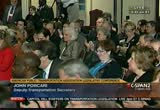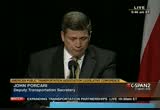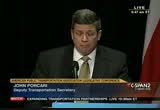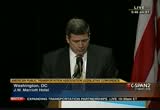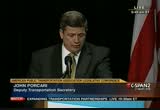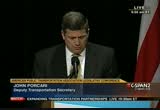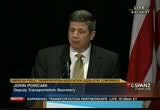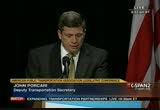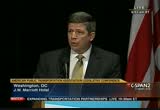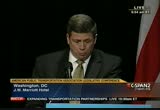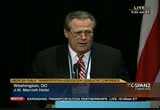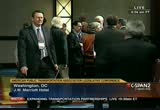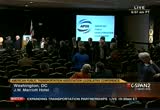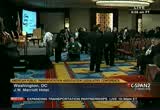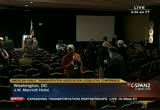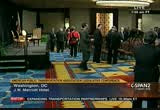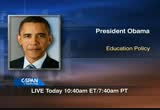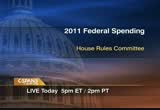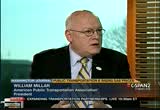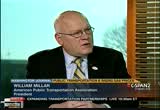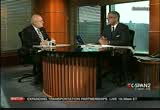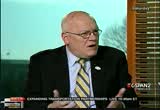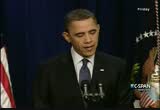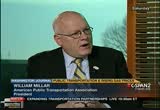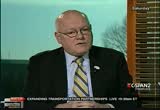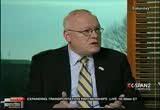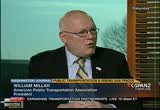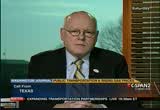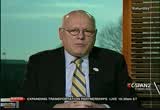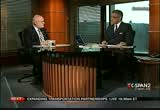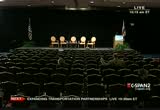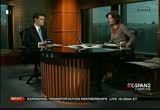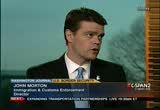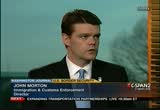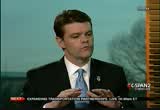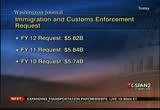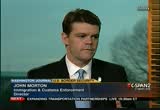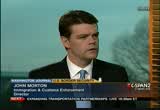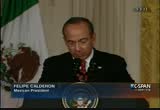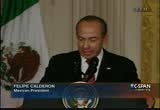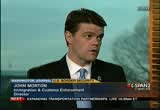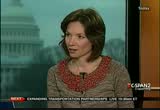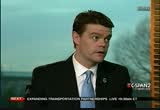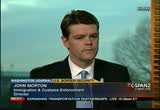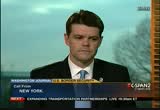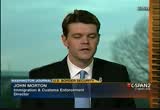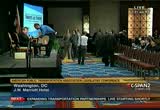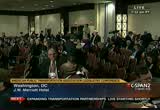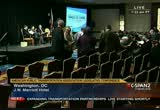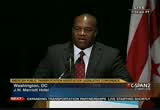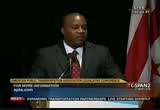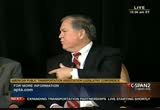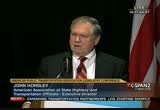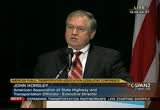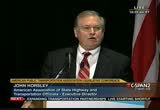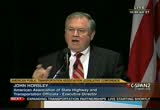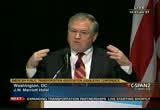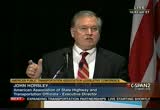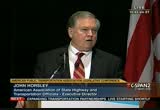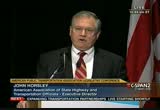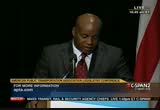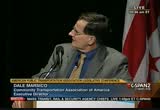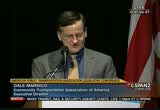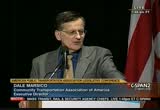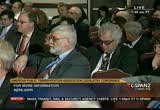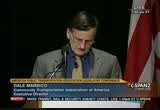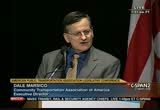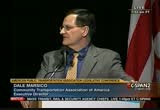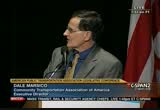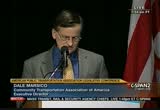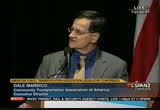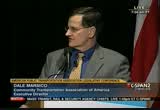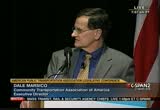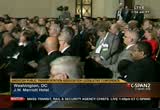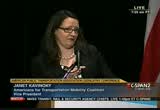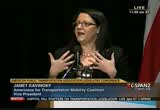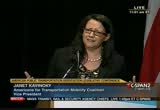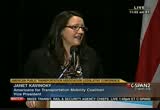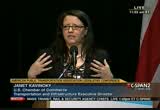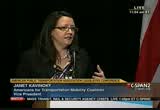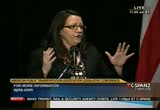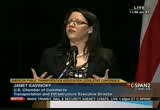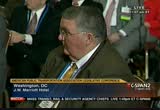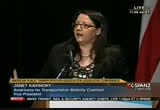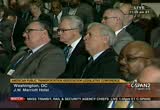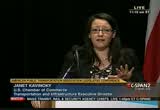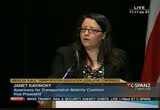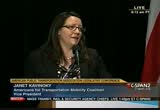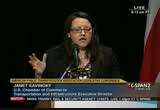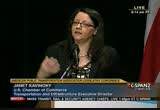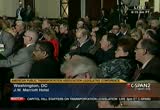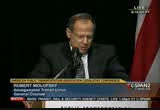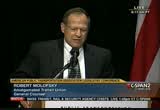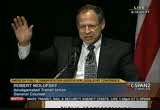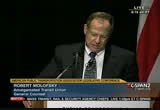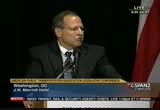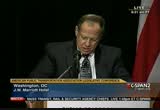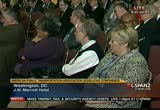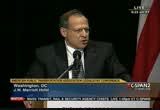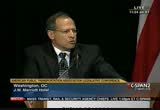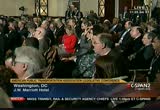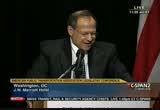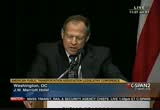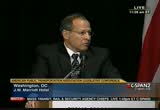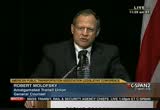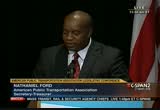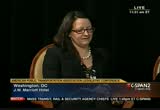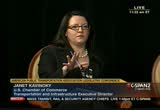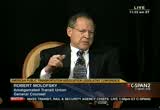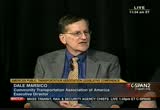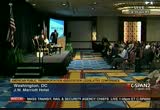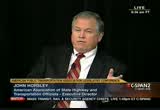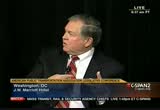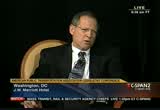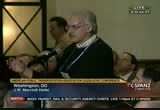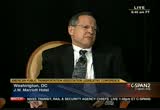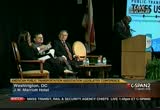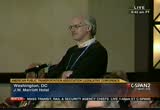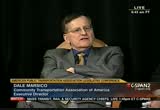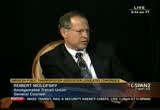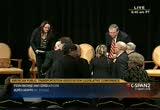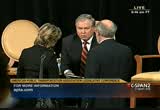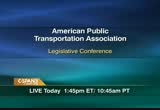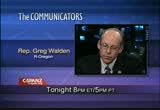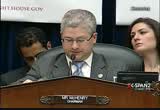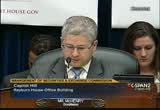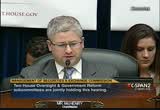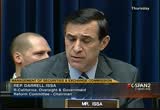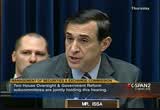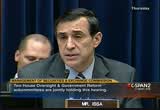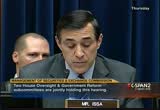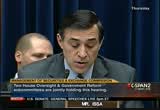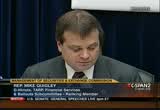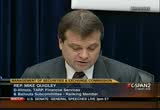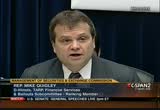tv U.S. Senate CSPAN March 14, 2011 8:30am-12:00pm EDT
8:30 am
what's your take on the repatriation holiday? >> guest: i think it's good. i don't think it ought to be just a holiday. i think we need to look broader than a one-time deal. we need to be more competitive. i know steven balmer, head of microsoft when he was in town when the president of china was here, and he talked about those issues and you've got to make a decision to expand somewhere. do you do it where the money is, or do you pay a penalty to bring it back here and expand here? it's hard to go to your shareholders who you're obligated to take care of and say, actually, i'm going to take that 20 or 25% hit and bring the money here and build when i can do it less somewhere else. i think all of that matters. and even though i concur that studies show it department quite go into reinvestment, but it went out to shareholders. somebody's paying capital gains tax on that. and by the way, that's money in the marketplace which is better than having it offshore and used offshore. i'd rather have it here in the
8:31 am
form of dividends to shareholders or investment in the country and than never used in america. >> host: congressman greg walden is chairman of the commerce subcommittee on communication and technology. mike zapler with ""the politico"," thank you both. >> guest: thank you. >> coming up on c-span2, a portion of recent testimony by transportation secretary ray lahood on president obama's 2012 budget request. then more on transportation as we bring you live coverage of the american public transportation association's legislative conference. later, the senate returns at 2 p.m. eastern for general speeches. that'll be followed later by debate and a vote on a u.s. district court nomination as well as a procedural vote on a bill authorizing small business administration programs. >> author, poet and playright ishmael reid is on "in depth,"
8:32 am
live sunday, april 3rd. he's written over 25 books including "airing dirty laundry laundry," "another day at the front." join our three-hour conversation taking your phone calls, e-mails and tweets for ishmael reed, and watch previous "in depth "programs at booktv.org where you can find the entire weekend schedule. >> the senate transportation committee recently looked to president obama's 2012 budget request. testifying was the department's secretary, ray lahood. we'll now bring you a portion of that hearing beginning with his opening statement before taking you live for coverage of the conference of the american public transportation association. >> thank you, mr. chairman, ranking member hutchinson, members of the committee, thank you for the opportunity to discuss president obama's
8:33 am
fy-2012 budget request for the u.s. department of transportation. president obama delivered a powerful message in his state of the union. he said that for america to win the future, our citizens, company and companies need the safest, fastest and most reliable ways to move goods and information, and he reminded us if we build it, they will come. if we want businesses to open shop and hire our families and friends and neighbors, we have to invest in our roadways, railways and runways. we have to invest in 21st century buses, streetcars and transit systems, and we have to invest in next generation technology for our skies and sidewalks and bike paths that make our streets more livablen livablen -- livable. and all of this is included in the president's $129 billion 2012 budget for the u.s. department of transportation designed as the first installment of a bold six-year, $556 billion reauthorization proposal. now, to make room for these
8:34 am
essential investments, president obama's 2012 budget proposes the lowest relative level of domestic spending since president eisenhower was in office six decades ago. that was ten administrations ago. the simple fact is that we have to cut and consolidate things that aren't growing the economy, creating jobs or making easier, making it easier to do business in order to pay for the things that are. so at the department of transportation president obama's budget slashes red tape, it consolidates more than 50 programs, and it includes reforms that will accelerate project delivery and empower local communities. of course, our major objective is to make investments in the tomorrow that expand economic opportunity today. to dream big and to build big. on the cover of our budget, is a picture of a bridge that crosses the hoover dam, connects nevada and arizona. seven years ago or more people began planning for this bridge. and if it weren't for the big
8:35 am
thinkers and the big builders of generations ago, we wouldn't have had the opportunity to dedicate this. that's what this budget's about. that's what this vision's about; big and bold just like people who came before us who had big visions, big, bold view of how we put people to work and how we build america's infrastructure. our budget keeps us on track toward a national high-speed rail system with an $8 billion investment in 2012 and a $53 billion investment during the next six years. it increases resources for highway and bring improvements by 48% and increases funding for affordable streetcar and transit systems by 126%. it includes a $50 billion up front to keep our coifer -- recovery moving and a $30 billion national infrastructure bank that will finance projects of national significance over the long run. at the same time, safety is and
8:36 am
always will be our top priority. president obama's budget renews our commitment to prevent traffic crashes with resources for ongoing campaign against distracted driving, drunk driving and to promote seat belt use. the president's proposal requests new authority for the federal transit administration to insure the safety of rail transit riders across america, and it gives the federal motor carrier safety administration stronger capacity to keep commercial traffic safe. finally, we're dedicated to doing all of this without passing on another dime of debt to our children and grandchildren. transportation spending will be summit to paygo provisions that insure the dollars we give out do not exceed the dollars coming in. these are just a few components of the president's plan. they reflect a much larger point -- america's transportation system is at a crossroads. our choice isn't between policies on the left or policies
8:37 am
on the right. our choice is whether our economic recovery rolls forward or falls backward. it's up to us whether we lay a new foundation for economic growth, competitiveness and opportunity or whether we settle for a status quo that leaves america's next generation of entrepreneurs, our children and grandchildren, with clogged arteries of commerce. it's up to us whether we do big things or whether we do nothing. and if we choose wisely, our legacy can be an economy on the move and a future that america is prepared to win. with that, mr. chairman, i will be happy to answer questions. >> thank you, mr. secretary. um, the administration has said that it's developing a comprehensive legislative proposal to support service transportation authorization. reauthorization. and the president's budget request frequently references that proposal. however, weeks have gone by, and we have yet to see anything.
8:38 am
the committee is developing reauthorization legislation and such a legislative proposal would be helpful in understanding the administration's goals and intentions for reauthorization. >> we are working with our colleagues at omb through the process of a legislative proposal, and we hope to have one to you. it will be a reflection of the president's budget. >> yeah. we have that problem more than i would like. we have it on cybersecurity. you've got four committees involved with cybersecurity, and everybody's more or less figured out what to do, and olympia snowe on this committee is a huge part of that. but we haven't got anything out of the white house, and that refrain increases just a bit here in the senate. if we are to have an opportunity to pass this bill and to move it quickly, we're going to have to know where the money's going to
8:39 am
come from. that's a big chunk which is unfunded. and as you referenced, the president said what east not for -- what he's not for which is raising the gas tax, but he hasn't referenced what he might be for, and at some point we're going to have to come to grips with that. >> well, mr. chairman, we're prepare today work with you and other members of the congress in a bicamera way to find the resources we need. we want to put a big vision out. that's what the president's done. this is a big, bold vision. it's the boldest vision anybody can remember a president has ever put out in terms of transportation. and we're prepared to work with you and others in the congress to find the resources to make this vision a reality. >> and that does mean that he'll, that his team will be proposing along with us? >> we will work with you and anybody who want withs to find resources to fund this big, bold
8:40 am
vision. >> okay. what is -- is everything on the table for funding as far as the -- >> the president has said very clearly through me and others that he is not in favor of raising the gas tax when unemployment is at 8.9%, and we still have a lousy economy. there are some people many this country that can little afford to buy a gallon of gasoline, let alone one that's been increased by an increase in the gas tax. >> i understand that, and i agree with that, but then there's what might be on the table. and if you can't answer it, i won't, i won't press it. it's just that it's comforting as you prepare for legislation to know how you're going to pay for it. um, senator hutchinson.
8:41 am
>> um, mr. secretary, i said in my opening statement that i'm very concerned about the what i consider to be extraordinary increase in the options account of the faa at the expense of many of the capital accounts and infrastructure accounts. so could you explain why there's a $400 million increase over fy-'10 in the operations accounts, and if you are concerned about the diminishing of the capital accounts when we are trying to put forward a next gen which is probably the biggest thing that faa will be doing in the next ten years? >> let me just read this for the record, senator, and then if you want more clarification. want more clarification. the fy-'12 budget requests 5%
8:42 am
increase -- pardon me, .5% increase for operations. the fy-'12 budget requests 5% increase for facilities. the operations account would increase by 3%, the f and e account by 5.5%. the fy-'12 budget requests 1.2 billion. my last point is this, the fy-'12 budget requests 1.2 billion for next generation technology which has grown from 695 million in 2009 which is a 72% increase for next generation technology. >> well, my staff tells me that you are looking at the up front, the $50 billion up front part of your bold vision, and i'm -- that's including a $3.1 billion
8:43 am
increase for the airport improvement program and 250 million for next gen applications. but that's from the general fund, and i'm asking why the operations account is going up so much in your regular budget process, not the up front vision -- >> let me ask our budget concern. >> yes. and and i apologize because i failed to introduce chris bert ram who's the assistant secretary for budget. >> well, i apologize too because i forgot to mention him. >> ma'am, the operations account for faa has been increasing on average 3% annually, and we've actually, i think we have a similar concern. this year the increase is only half a percent, it's probably the lowest request that we've ever had, so i think it's something we are cognizant of to try to keep operations costs at a reasonable rate of growth.
8:44 am
>> keep in mind that we had huge increases in the last two years. that's why so many of us are looking at 2008 as a benchmark rather than the inflated spending that occurred in 2010 and '11 of '9 and '10, but '10 and '11. so my e question is, why are there so many more in the operations and salary areas when you've had such increases in the last two years? where is the effort to bring operations more in line with maybe the 2008 levels or just knowing that our fiscal house is not in order? why would we be increasing so much in these -- just it seems like really throughout the department we are increasing so
8:45 am
much in the operational costs. >> like i said, i think on the faa side in terms of operations, we have one of the smallest increases we've ever had in a proposed budget. the cost drivers for operations are thing like utilities, hiring additional inspectors that work on the safety side at faa as well as increased salary costs. >> well, i think we need to look at how, how much of that is some more inspectors. i -- >> we can, we can break that down for you exactly where all of the increases are in the operation. >> it's a smaller increase, but you've had two years of big increases then that's -- we're just not getting, i think, the, the message that, yes, we have bold visions, but you can't just keep throwing money at operations and create these big visions or implement these big
8:46 am
visions. >> okay. >> so i'll be anxious to hear more detail, mr. secretary. thank you. >> thank you, senator hutchison. >> thank you, mr. chairman. thank you, secretary lahood and assistant secretary bertram. i wanted to ask you, secretary lahood, you and i had the opportunity to speak last week about the we moil bridge -- memorial bridge in portsmouth. would you still agree that's one of the worst bridges in america? >> it's one of the worst bridges in america, senator, and that's the reason that we provided the money that we provided so that you all could have a new bridge. >> and, certainly, you know, we appreciate the commitment when you came to portsmouth to the project and wanted to ask you about the actual approval process that new hampshire and maine are going through right now.
8:47 am
there is a process that is undergoing a nepa review, and the nepa review itself, as i understand it, we've already undertaken a review in the past that was sufficiently completed in 2008 and actually approved. are you familiar with that? >> what i know, senator, is that we believe all the approvals will be completed by late summer, early fall. >> as i understand it, the nepa review that was already approved, the one that has been resubmitted is very substantially similar and be very few differences between the two. would you agree with me on that? >> uh, i don't -- i'll have to answer you for the record on that. i don't want to say that i know in intimate detail that that is similar to. i'd rather answer you for the record. i know this, that based on what
8:48 am
the conversation that you and i the conversation that you and i had, i went back and did the research on this project and was told by my staff that all the approvals will be completed by late summer, early fall. but on the specific question, i'll do it, i'll give it to you for the record. >> well, i would appreciate that because i actually have a comparison in front of me between the two, the nepa review that was already done and the nepa review that has been resubmitted, and there's only o one minor difference between the two. and so given that, i'm asking you why we cannot expedite the review process within your office. to insure that, essentially, as i see this very little difference in paperwork that we've already done and already gotten the full approvals for for a project, as you know, that both states are deeply committed to. can i have your commitment to
8:49 am
expedite the review process within the department of transportation? >> absolutely. you can have my commitment. >> well, i very much appreciate that and be look forward to working with you on it. so that we -- >> can i just, just on this, on this project, i want everybody to know that if bill that passed the house is passed in the senate, the last line of that bill says that any funds not obligated by february 11th will come back to the treasury. so i just, i want to just let everybody know that. these are all good projects. we wouldn't have funded them if they wouldn't have been good prompts. these are all projects that need this money, and so we just want this money, and so we just want to make sure everybody understands that. you have my commitment to do everything we can to expedite this project. >> well, i appreciate that, mr. secretary. and particularly since having reviewed this which i know that you will do, the commitment from both of our states of already having gone through the paperwork process once, i'd hate
8:50 am
to see the bureaucracy stand in the way between the project when we have gone through already the proper review. so i appreciate your commitment to expediting the process within your agency because, you know, too often, unfortunately, the process itself even though states have complied can be very onerous, as you know. >> absolutely. you have my commitment. >> thank you. >> thank you. >> thank you, senator. again, now, before we were having committee chair and ranking member comments, this is all done by order of appearance. therefore, senator lautenberg is next to be followed by senator cantwell, then senator begich. >> thanks, mr. chairman. mr. secretary, as i said before, good work being done there. appreciate your effort and your skill and weaving your way through the difficulties and
8:51 am
making sure that our transportation agenda moves along. in florida governor rick scott has said that he rejects $2.4 billion in federal high-speed rail funds. northeast corridor could start putting these funds good use now to boost our economy, improve our existing high-speed rail service and create jobs. if funds are returned to d.o.t., will the northeast corridor be a priority for receipt of these funds? >> we have a request from just about every member of congress on both sides of the capitol for these funds, senator. >> for the northeast corridor? >> many of these senators and representatives are from the northeast corridor. and we will, we are working our way through how to process the reallocation. >> the bill proposed by the house republicans are slashed
8:52 am
funds to replace the 100-year-old bridge in jersey. this bridge carries more than 400 trains and 180,000 people every day. one of the busiest passenger rail corridors in the country. what might be the effect on commuters' mobility and the economy of the northeast corridor if the house republicans have their way and the portal bridge doesn't get replaced? >> well, we're committed to working with you and others for the replacement of this bridge. it's absolutely critical for safe travel. it's absolutely critical to the citizens of new jersey and new york, and we, we remain committed to making sure this project moves forward.
8:53 am
>> 2009 president obama signed into law the legislation i wrote to establish a marine highways grant program. t to promote moving more -- it's to promote moving more freight by sea. unfortunately, funding for the program was not included in the president's budget. now, given the congestion on our highways, ware and tear -- wear and tear on our roads, shouldn't we be encouraging more freight to be moved by ship or barge at this point in time? >> last year, senator, i convened, i think, one of the first meetings ever of all the ports in the country to talk about the importance of ports, talk about our commitment, this administration's commitment to every port in the country. we believe that the marine highway, which is a signature program, signature transportation program for our myriad organization, could be
8:54 am
funded through the infrastructure bank. we believe that is a pool of money where good marine highway projects which we believe in, we think are important to relieve congestion could be funded out of. >> well, while i commend the president's proposal for a robust investment in our transportation system, the budget doesn't specify how we're going to pay for these investments. same time, gas prices now keep going up with proceeds going to the big oil companies and countries that don't like us. rather than being reinvested in our infrastructure. what options are there to pay for the administration's proposal? >> as i said to the chairman, we are committed to working with any member of congress who wants to be helpful in funding the the big, bold vision that the president has for transportation and infrastructure.
8:55 am
>> we need a big, bold bank account to do that, mr. secretary. thank you very much. >> thank you. >> that's it? >> thank you very much. >> senator cantwell. >> thank you, mr. chairman. secretary lahood, again, a couple of different questions. one, the columbia river crossing as a pretty big project for us connecting vancouver, washington, to portland, oregon. and it's kind of one of a kind, really, when it's that big a multimodal project including light rail, so we very much appreciate it's in the president's budget proposal, so thank you very much for that. we have some questions, i think, for the record on how the fta match is calculated, so if you can b bear with us on that. but the larger question, with the federal highway administration and the federal transit administration involved in potentially the design of the bridge, maybe even the faa involved, does it make sense to have someone within the secretary's office assign the role of project facilitator when
8:56 am
it's interdepartmental design issues? >> we had a meeting with both governors when they were here for the governors' meeting. i met with them on a sunday afternoon. we made a very, as strong a commitment as we could make to the columbia bridge crossing. it's one of the very unique infrastructure projects that really reflects big, bold intermodal, it includes highways, it includes transit, it includes freight, it includes an opportunity for just about every mode of transportation to be included. it also includes a lot of different funding sources which are very -- that's what makes it creative and very unique. and i told both governors that i would find someone within my office that would be on this particular project until we get it to construction. >> and do you view them as a
8:57 am
facilitator? i mean, my colleague was, you know, asking about eia statements, and we think about every agency going through a different siloed approach o o that. >> uh-huh. >> you could see how the project could drag on for a long time without those agencies coordinating. so you would view that as a facilitator across the groups? >> yes. we would have a person assigned to this project in order to make sure that all the bureaucratic paperwork is coordinated in a way that keeps it moving. >> and complete inside a timely fashion. >> correct. >> okay, great. thank you very much for that. on the mexican trucking issue, the press release that the president's office eshooed said -- issued mexico reduces by 50% once the agreement is assigned. and then talked about normalization. what does normalization mean to the mexican government? i want to confirm that they are going to reduce their tariffs by 50%. >> on the day the, on the day
8:58 am
the agreement is signed, 50% of the tariffs will come off. on the day the first truck starts rolling across the border, the other 50 president of the tear do -- 50% of the tariffs will be taken off. >> and that's the understanding in the agreement? >> that's the understanding of both countries, absolutely. >> all right. thank you, mr. secretary. now, back to my opening statement about freight mobility. where, what are the department's intentions in creating a dedicated program? and do you think that that strategy is in your office or led by the highway administration? >> i -- one of the things that we've done over the last two years under the tiger program which was 1.5 billion, we gave half of that money to our freight rail friends. we want to enhance freight rail. weaver doing this in a way -- we're doing this in a selfish way because we need our friends in the freight business to help our ability to get our
8:59 am
high-speed rail program going because there's not enough money to build infrastructure all over america. we want to use the great freight rail system that we have. we have reached agreements with a number of the freight companies in the states that have received high-speed rail money. we're very pleased with the cooperation that our friends in many freight rail have given to us not only in accepting the us not only in accepting the money, fixing up infrastructure, reaching agreements with the states. i think we have about as good a relationship with the class i freight rails as has ever been developed over the long period of time. not only because of the money they receive, but because of the commitment they're making to let us use their tracks. and so all of this has been coordinated through my office. >> great. so what i'm talking about now is how do you -- so that's great, so it sounds like you're ready to take the next step, too, maybe in coordinating on the physical transportation highway side. of coordination, of making
9:00 am
sure -- because if you're betting on that rail infrastructure, you've got to bet on the trucks in a cohesive framework to get to those rails. and, obviously, in coordination with the ports. and, you know, obviously, the more congestion there is in any kind of area like tacoma or seattle or what have you. and if you don't have a plan like that, you're not only costing consumers and their own transportation, but you're costing the movement of goods and services, and we have a very, very competitive vancouver, british columbia, above us that is willing to take all of this business if we don't get this right. >> so you're talking about truck -- is that -- >> coordination of the system together. >> yeah. look, i think that we are committed to a coordinated system. we're working with the trucking industry on their ability to continue to be competitive. they weren't, you know, particularly enamored of, you know, some of the proposals that were being floated around with respect to the mexican truck,
9:01 am
the cross-border, but we met with them, and we worked those out. we think, you know, the trucking industry is vital, and all of this has been coordinated through my office, and i have taken a personal interest in meeting with the trucking industry and the freight industry and the port industry to really make sure there is a lot of coordination going on. lot of coordination going on. ..
9:02 am
>> thank you for the. i know which is a different schedule but i appreciate your commitment. let me make sure i understood your question, or the comments, i use your words, the bold vision. the reality is the vision is there but there's not a funding mechanism yet. mechanism yet. the president is not recommending one, you're waiting to work with us but there's no funding for it, i just want to make sure we are -- >> we know that there's a highway trust fund is a way to fund part of what we want to do, yes. >> so as a part. we just have to figure out the gap. >> that's correct. >> on the infrastructure bank which i am intrigued about it. when i was a man we talked about infrastructure bank. how will you treat rural states, and obviously in alaska we are as rural as you get. is it intended to have some recognition because it will be hard for us to compete against the large communities.
9:03 am
you will base it on the population. so forth until a. and rural states will lose out in that form the. is there any consideration you will take or any -- >> i think a state like alaska can compete. certainly you're important to compete for infrastructure money. come directly to the department and because of the port you have -- >> support in anchorage? >> correct. i mean, i've met with them. they have a very good vision come and infrastructure bank will assist that vision. so we will be encouraging them to utilize that. and when it comes to rural america, rural america will not be left out. when it comes to roads, we know that there are some places in rural america that need to enhance their roads. and there will be opportunities to do that in our plan, and our vision can't either through are
9:04 am
accessing a highway funds or accessing the infrastructure bank, through leveraging perhaps some loan programs that we might have. we are committed to rural america, whether it is transit through teaming up with transit programs, but in the case like a state like alaska, we have to look for some innovative ways. we think the infrastructure bank is certainly one of those ways to do that. and our regular transportation program. >> very good. this was on my list but you made a comment, i want to make sure i understand is more of an education to people that might be watching or out in the audience. at february 11 i can you mentioned, that is in the c.r. that is coming over from the outside? >> that is in the bill that eliminated $60 million of the program. >> that is in the house bill 1? >> yes, sir. it's the last sense of the bill.
9:05 am
>> february 11? >> yes, sir. >> that's just a have to go back, resources that communities have, may be in play already? >> any money that is not obligated before february 11 obligated before february 11 goes back to the treasury. >> so they may have a plan but it's not yet -- >> they may be this close to it but it doesn't make any difference. >> you've got to go back. where they had signed the dock at february 25? >> gone. the money goes back to the treasury. >> that even if today, a community, a state, a city signed a contract, obligates the funds, let's say obligate, obligates the funds, puts it in the account, ready to be put towards a project. they've got beats going out. in some cases, might have led to
9:06 am
did. if it's after february come you can come in and say i'm sorry, you can't spend that money? >> that's correct. >> the legislation that is in front of us today, h.r. 1, has a one line in there, that says -- >> that's correct. >> i want to make sure it's clear so it's on the record so it's not nice at me. i agree with you on this. i just want to make sure it's very clear there is one of the unique times, some might be doing a summer construction project on. >> i really appreciate your ability to get levitation on this, senator. >> as a member of the former metropolitan planning effort in the city of anchorage, obligations are critical. and what i'm hearing is that by on some of those? >> that's correct. mr. chairman, can i continue on this point for one second? >> you can see the remainder of this hearing on our website. the american public transportation association is
9:07 am
beginning its annual legislative conference here in washington today. the apta represents organizations involved in various modes of transportation. speakers will include deputy transportation secretary john porcari. this has live coverage on c-span2. >> we just came from i think and awe-inspiring speech by governor tommy thompson, has recently joined apta as an advisor on our transportation issues. so i think he presented a great perspective for each of us as we do our work in washington. and our list of great speakers continues. and a few minutes we will hear from deputy u.s. secretary of transportation john porcari, a longtime active member of the transportation fraternity, and a good friend of apta so we're very pleased he is with us. brought with him our fta
9:08 am
administrator, peter rogoff, and later we will hear from our ab r. h. a p. administrator karen rate. and an agency we don't often hear from, but we are very pleased that the tsa, transportation security administration, will be represented by chief of staff art masao's. and he'll be giving us an update on the activities that are so important to us in the area of transportation security. later today we'll hear from congressional staff, and we will close out the day with some good advice from veteran congressman, republican from ohio, and democrat earl blumenauer from oregon. so i think by the end of the day without a much better picture of what's going on in washington, what's being proposed and will we might do about it. but tomorrow we'll have some additional great speakers. we are expecting secretary ray
9:09 am
lahood from the u.s. department of transportation. we are expecting that chair of the transportation and infrastructure committee, john mica from florida. and we are expecting the ranking member from the railroads subcommittee in the house, also from florida. so i think you see we've got a good line up for you. we're going to be hearing from republicans, from democrats, from the administration, from congress, from many, many folks who know their way around washington very well. well, we are here in washington at a very important time. not only for public transportation and the millions and millions of americans who rely on public transportation, but indeed for our communities, our economy and our country. now, like for most americans, 2010 was a difficult year, and it was a difficult year for those of us in public transportation as well.
9:10 am
many of you have to take very difficult decisions. you had to raise fares. we are not allowed to have an unbalanced budget, so you had to raise the prices sometime. sometimes you had to cut service. reluctantly, sometimes layoffs were part of the mix. for a business members it meant fewer orders. and again, not able to maintain the workforces to the levels that they would like. so it's been a difficult year, but, you know, the first part of 2011, things look like they're looking out for us and for the country. we certainly are glad to see that that very high unemployment rate seems to be coming down. we're certainly seeing more optimism than there's been, and hopefully 2011 will be a better year. one of the things we've already seen in 2011 is higher gas prices are now, that certainly doesn't make anyone happy.
9:11 am
and, of course, for public transport it's kind of a double edged sword. the good part of higher gas prices is it means more americans will be seeking alternatives to have a travel. and we are often at alternative. and already we are getting reports from around the country of double-digit ridership growth. but, of course, that double-digit ridership growth comes with a mixed blessing. we're glad to have the more writers, glad to be of greater service, but because of the economic downturn and the issues i just spoke of, many of you have less service to offer today. so it's more important than ever that we have additional investment in public transportation to accommodate those americans who want to make that choice. now, we know that when people choose to use public transportation, many good things happen. not only do they have a way to
9:12 am
get around and do the things that make their life better and more complete, but we know that this is good for the economy. we know that households that choose use public transportation can save on average $9900 a year. that's more than most households spend on food. if you think of it this way, take public transportation, teacher food for free. not sure everybody looks at it that way, but in essence that's what it is. we know from experience that more americans will start to use public transportation, and we remember 2007-2008 when transit usage was at record levels. and what i've asked our apta research department to do is examine that history, see what we might expect if as many economists are predicting, gas prices already above $4 a gallon
9:13 am
on the west coast, and in some communities, if gas prices generally go to $4, or maybe $5, or maybe $5, are what happens if they hit a $6? so you'll see and you will have in our information center and on our website, you'll see a report that we are releasing called the potential impact of gasoline increases on transit ridership. and i want you to take a look at this because i think it will give you some insight to what you need to be planning for on your system. for example, if the average price in gas goes over $4 across the whole country, we would expect an additional 670 million rides. what's that? that's 2 million more rides a day on public transportation. well, how about if that price goes up of $5 a gallon? a definite possibility, according to many economists.
9:14 am
well, if past trends hold that would indicate that about a billion, that's with a b., a billion and a half more rides will be taken by americans, and that we would see annual ridership of 11.6 billion. well, some people think that the price of gas could even reach $6 a gallon. well, what would happen with that? we surely would have crowded trains and crowded buses, and it would probably be people who wouldn't be able to get on because that would result in some 2.7 billion more rides, almost 13 billion rides a year. levels of ridership that haven't been seen in more than 60 years in this country. so, i think this is a sign of things to come. of course, i said it's a double edged sword because many of us use diesel fuel in providing our transit services. and so it also means higher costs. so working with the federal
9:15 am
government, working with state and local government to take advantage of the recovering economy and the need for additional investment is why we are here in washington, d.c.. now, as bad as this entire could be for many americans, they simply have no choice at all. the census bureau tells us that 46% of american households, almost half of all the american households, have no public transportation. not a, nothing. not one busted a. not a train once a week. they have no public transportation. so again we think that if those americans are to have a choice, if they want to do the right thing and take some of their trips by public transit, we need to be expanding the amount of public transit in america. which brings us here to washington. we want to speak with the congress about expanding the travel opportunities for americans are about making sure
9:16 am
that communities have the right kind of bus service, the right kind of rail service, the right kind of public transit service for the size of their communities. but, you know, it's a very difficult budget year in washington and that's what you're going to hear everywhere you go. every office you visit. you know that the congress has yet to be able to finish its work on even the appropriations for the current year, the school year 2011. they are already five months later. and you know that in house of representatives house of representatives with a bill they passed a couple weeks ago, it would cut funding for public transportation, cut funding for high speed and intercity rail. and this is just at a time when america needs more public transportation. so we don't understand that, and that's what we need to get with our congressional representatives, our senators and congresspeople to explain
9:17 am
just how important investment in public transportation is. that congress is very much focused on debt reduction and cutting spending. and we certainly as americans understand the need to deal with the fiscal issues that our federal government has. but we need to help our congressmen understand that investment and public transportation is just that, it is an investment. it will pay back many, many times over. now, you know the statistics but i'll go over them again just for you. every billion dollars invested in public transportation supports or create some 36,000 jobs. we get about $4 back for every $1 that we invest in public transportation. we know that as america grows and we're expecting 100 million more americans, that as our economy grows, our population
9:18 am
grows, we need to accommodate that need for travel. so it's not just the annual appropriations bill and we need congress to finish, but we need a well-funded six-year multimodal service transportation bill. that's what we need to do our job. [applause] >> now, president obama is showing the way. if you had a chance to hear his speech on the state of the union, you heard things that we in transportation, whether you're in public transportation our roads our railroads, have been waiting for any president to say for a long time. and that is to make the case for investment in infrastructure. you know, infrastructure is one of those hard words to say and think about, it's sometimes hard to get your head around it. but it is the transit system, the roads, the railroads, the air system, all those things are part of transportation
9:19 am
infrastructure. and that's what allows our economy to function. it allows efficiency to occur. and as the president said, we need to win the future. and have a good infrastructure to build upon, well, in football i guess it's like that basic what, blocking and tackling that so important, or in spring training, so in baseball it's the fundamental fielding and hitting that supports the whole rest of the game. and that's what we need to work on. now, i'm sure that secretary porcari was going to tell us all about the administration's proposal, and i sure don't want to steal his thunder. but that president budget is amazing for public transportation, and we need to get behind and supportive. it literally could be a game changer for tens of millions of americans. and when tens of millions of americans are better off americans better off. so it's a great thing. and we will look forward to
9:20 am
hearing more about that. and obviously the presence proposal is just the beginning. certainly the congress will want to consider it and review it. and if they want to improve upon it, we will work with the congress to improve upon it. but it is a great starting point, and we are grateful to the president and the administration for their good work. well, congress is very busy right now and getting together, and of our told you about some other issues. and you know, with many, many new members of the congress, not all of them really understand or know very much about public transportation. and that's where you come in. that's why we've asked you to leave the comfort of your homes and come to washington, d.c., to meet with your congresspeople, to meet with your senators, to meet with their staffs, to help them understand just what it is among their constituents that would be missing if there were not good public transportation.
9:21 am
and what more could you do if there was additional investment, what more could you do for their constituents? because that's why we're in this, we are in this business to help america and americans. so, i want to ask you, don't be shy, get up on the hill, talk to your congressional representatives and help them understand what it means. and while we have a great lineup of speakers here, i always give you a pass if you need to go up on the hill to meet with your congressional people. none of our speakers will mind if you're not in the audience if you're up on the hill doing the right thing. so please do that. and as always, if you need help making appointments are finding where your congressman is now located, because there's a lot of changes in officers, as always, the staff is able to help you. if you need more information, go up there, our latest brochures and reports, up on the next
9:22 am
level of this hotel you will find legislative actions and where you can pick up that information. and i don't many of you got an e-mail from us last friday when we asked you to fill out before you left home the data about your system, how big is your system? how many people are using it? how important is federal aid to your system? when you stop and think about the formula money and a special discretionary money and other parts of the federal program, some get operating assistance, some get maintenance assistance. when you add altogether, many transit systems the federal aid is worth perhaps 20, 30, 40, 60% of the total revenue of the system. i'm not sure that every congressman understands that if they chose to eliminate or cut severely public transit aid, many transit system would be unable to serve their constituents. so don't be shy about telling them these stories.
9:23 am
and as always, we are producing reports that we hope will be useful to you. we've got a couple of new ones that we are releasing at this study in addition to the gas report. one is a report on the case for business investment in public transportation. why should the private sector care about public transportation? why should they make investments? and our newest report, we are just releasing today, the case for business investment in high speed and intercity rail. there's been a lot of controversy about high speed and intercity rail. certain governors in certain states have gotten a lot of mileage and publicity out of the issue. but there may have been three governors that didn't accept the money, but more than 30 governors or 30 states are working every day with that federal aid. at and upon. [applause] >> to make america and their states a better place. and you know, you may run a
9:24 am
small bus system and use me say what is intercity rail have a to do with me? you can have a good intercity passenger system unless you can get to the system, and less you can get from that system when you get to your destination. and that's the direct tie between local public transportation and intercity rail. so, don't be shy. tell your representatives what it means in their community. if you don't do it, i don't know who will. last year we asked you to tell your story. this year as you hear from mike scanlon in a moment, we are taking up a notch or we are telling you to sell your story. so you do the right thing for america. you enable people to get to work. you enable people to get to an education. you enable people to get to health care. and to do all the other things that they need to do in their day to make their life and their families a success. you shouldn't be shy about
9:25 am
telling that story. it's great news indeed. so go up to the hill. tell them your story. thank them for the aid they have given you in the past. tell them what you did for the money the appropriate last time. so that they can have covert that they spent it well into the benefit. and above all, tell congress we want a well-funded six-year multimodal service transportation bill, and we need it now. [applause] >> so welcome to washington, and let's get on with the program. now it is my great pleasure to introduce to you mike scanlon. mike is the chair of apta this year but might also in his spare time when it's not doing apta staff, runs the san mateo transportation system out in california. also helps run that caltrain and so many other services vital on
9:26 am
the peninsula south of san francisco. ladies and gentlemen, please join me in welcoming mike scanlon. [applause] >> thank you. good morning and thank you, bill. welcome everybody to washington, and i think more important, thank you all for coming. it's very, very important that you are all here, and we'll talk about that in a minute. but before you do that, bill, thank you so much for your inspiring words and for your energy. i was thinking this morning a bill when i was in the shower. [laughter] speaker that doesn't sound quite like -- didn't come out quite like i met. it came out exactly like i meant. this is the last time that bill will kick off a legislative conference because as all of you i think all of you know, bill is going to be retiring at the end of october. and i just think we all ought to give him a standing ovation for
9:27 am
what he does and what he has been doing. [applause] >> i have appointed a task force to find his successor, and they were talking about attributes, and there's a lot of material in there for a lot of great jokes. i don't think i will go into them right now. i just don't know who is going to bring that energy. they talk about having bill millar's ancestors, some a link with the energy bunny or something to that effect, but bill, you've done a great, great job. and we are all grateful. governor thompson, i just want to straighten out the record, particularly for any of my board members, our staff director. steve lind was a little excited. he thought we had been traded and i was going back to pittsburgh for a draft choice in his going to san mateo. the governor and i were
9:28 am
bantering quite a bit about football seeing as his green bay packers with my pittsburgh steelers. i do no longer live in pittsburgh but my heart, particularly football heart, remains very much within. but i did tell him that if pittsburgh could when i was will glad to see a great traditional team like green bay from a small market with rabid fans like we have in pittsburgh go on and prevail in the world championship of football. i think him to steal a line from fda administrator peter rogoff, this is a year like no other. i know every year you, we typically say boy, it's really but it critical that you be this year. but this year we really mean it. and this you i really important. what you have on the table, this is right out of dickens, the best of times and the worst of times. what we have on the table is we have the administration has proposed a virtual doubling, better than doubling of the
9:29 am
infrastructure transportation investment program. and on the other side you get to approaching a half of having the program. so i mean it really is the swing between those two extremes is absolutely critical. and so you could say that they are great, great difficulties, or they are great opportunities. and the real difference between difficulties and opportunities isn't in the issue themselves. it's in ourselves in how we view it. and i thought the governor this morning was particularly effective at the same there's a lot of new members in congress, they don't know as yet. and while they may have some opinion, they may have no opinion or no knowledge at. and so we need to seize this as an opportunity. and go make it happen. i think that's the charge we're all going to have this year as we go forward. it's not only an opportunity. i think it's our duty and our responsibility, not to suggest to the customers we have today but i think for the future of
9:30 am
our nation. what we do in terms of transportation policy now is going to shape this nation for many years. and this is a very, very heavy responsibility and we need to take it if not ourselves, very strictly. federal investment may be as close to a magic wand that exists today if you really want to do something to get this economy back on its feet. ..
9:31 am
>> on foreign oil and, you know, given the turmoil and uncertainty in the middle east right now, all i can say is will we finally get it this time? we've had lots of opportunities over the years, and we seem to get all concerned and things happen, and then we go back to life as normal. i hope to hell we get it this time, that we are living in an unsustainable way, and we have to change fundamentally what we do. so when you go to the hill, as you'll be charged by every speaker to go to the hill, remind the members of congress that public transit already saves this nation $4.2 billion, with a b, billion gallons of gas each and every year. and we can do much more. households near public transportation drive an average of 4400, that's 4,400 fewer miles, and in so doing utilize
9:32 am
223 fewer gallons of gasoline each year in households that are near somewhat convenient public transportation. so our charge to, and n.p. carter charged us to tell our story, and all i'm saying is let's amp it up and sell the story. as effective advertisers will always tell you, you've got to tell 'em and tell 'em and tell 'em again. just about the time you're tired of telling them, they're only starting to get it. so we've got to continue to tell that story. so when you go to the hill and you meet with the members of congress, with the staff of the members of congress, make sure that you focus this story not on don't get -- i mean, we have all the materials you could ever want. don't make this more complicated than it is. what it's really all about is telling that member how investment in public transit or a lack of invest and
9:33 am
accountability for not investing if public transit will effect their constituents, will effect the quality of life if their district, and will effect the quality of life and the competitiveness of this mission in a world economy. there are big, big consequences to the policy we develop right now and going forward. it's not difficult to get the information. bill referenced the little handouts that were sent out last week with a few basic questions of how does this affect you and doing some simple math. and the people on the floor above us are available if you have any questions on that before you go up there. so when you go into a meeting, you know that information, and your job is to impart that information, i think, in a straightforward man or. you just look them -- manner. you just look them in the eye, and you tell them the story, and you relate it to how it really, on the ground, how it effects people, how it will effect people for the good or for the not so good. and give examples, specific
9:34 am
examples of who those people are. after business members, i mean, i can't tell you how thrilled i am that you've engaged tommy thompson. he's an increasingly -- incredibly engaging speaker and what a guy to carry our message to many, many people who may think they're against us or this industry is some kind of big government social program. it isn't. it's a fundamental part of this economy. it's critical to the well being of the country, and i think tommy will do a great job talking about it. so the business members, when you may have an edge up, i think that some l of the more conservative members of congress will have a natural inclination to give more credibility to your story because they see that private sector, and you tell them how many jobs are created or how many jobs could be lost. so it's the accountability and the consequence. it's the reward if you do it, the consequences if you don't. make sure they understand the
9:35 am
impact of their decisions. you know, our staff has told us that many people -- you've heard gary thomas and bill staff talk about some real on-the-ground experiences up there. so there are people that don't really have a preconceived idea. they may have thought they did, but now that they're in the responsible position, it changes a little bit. all of you know that my real focus this year is what i call inclusion, and that means getting everybody into our tent. and, boy, we need a hell of a big tent. because most of our stakeholders, many of our stakeholders don't even have a clue yet that they are stakeholders. they need to understand this whole story. the economic and social impact and how it rolls down so that they are and they do have a stake in that. i'm thrilled that we're going to partner today. bill millar at the board meeting the other day went through six slides and just listed some of the partnerships that we have.
9:36 am
and there are many, many more. tomorrow when i go up on the hill, i'll be up there with all of you, i'm going to be joining and joined with national league of cities, our counterparts at the national league of cities going in to see staff on key committees and seeing how people come together and how public transportation can be such a uniter of people that may have thought they had disparate interests but very much are in parallel and in common and dependent on one another. now, it's no secret that quite a few members of congress may have been elected with a singular focus of let's just cut the budget. well, you know, they swore an oath, and they're going to have to be held accountable for more than that very narrow focus. of just let's cut the budget. you have to make strategic investments to make sure that this nation runs well. and that the people in this nation enjoy the quality of life that i think our founders and
9:37 am
all of us and everybody really wants people to have. so because they weren't elected knowing about us doesn't mean for a minute that they can't be persuaded. if we're good. and if we take that message and sell that story to them and sell it in terms -- in a way that they can, that they can understand. i think perhaps more than anything what our nation needs right now, you know, you can turn on the television any day or read the papers, and everybody has opinions. but -- and i'm going to show my generational gap here. there's an entertainer, i think a very good one by the name of patti labelle. and in the mid '80s, patti labelle popularized a song called "new attitude." and, boy, what our country needs, in my opinion, more than anything else is a new attitude. we just keep wanting to blame other people for everything. we want to live in the past and
9:38 am
say if so and so did this or so and so didn't do that -- that is not going to get us where we need to go. where we need to go is we need to forge ahead and make enlightened policies, learn from our past and move forward. and, you know, the change in attitude begins with each of us. you know, be you want, if you want to change the world, the old saying is you've got to start with yourself, and i think we all have to do that. so when we go up on the hill, please, let's not challenge people personally. and let's certainly not challenge anyone's patriotism. this is a country where difference of opinion was once, was great. it was celebrated, that you could have an honest difference of opinion. and as shakespeare said, you know, fight mightily in the courtses and go and eat and drink as friends. we need to get back to that level of civility in this country, in our congress, in our
9:39 am
regions, in relationships with each other. you know, our war on drugs failed, our war on terrorism failed. let's not have a war on the middle class. let's talk about how we can change policy. the situation has changed. so let's change with it. let's be smart. but let's be positive about it. let's see the opportunities going forward. i mean, someday, you know, there were generations before us that would look at what we're going through now as a walk in the park, and they made it through those tight times. so i think it's tough now, but let's set the bar high. let's set the bar as high as we can possibly set it for civil discourse and try to go up on the hillthat's the first -- if that's the first date as governor thompson might have indicated, but back in the districts. if we're going to win the hearts and minds of the congressional people first and going forward the majority of people in this nation, don't do it by being
9:40 am
disrespectful. do it by the power of your story, and do it in an agreeable way so that even if you end up disagreeing, you don't have to be disagreeable. and when you're up on the hill, make sure that you stop by the public transportation showcase. in the rayburn and, excuse me, i'm going to go back to pittsburgh, foyer. for some of you that have class, it could be a foyer. [laughter] but in pittsburgh it was a foyer, and we also had a north versailles as opposed to versailles. [laughter] but nonetheless, go up to the rayburn foyer, foyer, whatever you want to call it, and there's some impressive -- you're going to see displays, the video wall, the testimonials of people who rely on us. let's never get behind and figure this is all about charts and graphs and numbers and who's going to win an argument. it's about the men and women who rely on us for service, the men
9:41 am
and women who get up each day and do this very honorable work for this nation. so, please, stop by and do that. and i think just in concluding just like the nike ad, just do it. this ain't complicated stuff. go talk about it, forget all the other forms. you don't have to have polish speech. look 'em in the eye, tell 'em what it means. so good luck and give 'em hell on the hill. in a nice way. [applause] next, it's my real pleasure -- your program shows that d.o.t. secretary ray lahood was going to be here, but there's been some switching in the program, and i believe the secretary's going to be with us tomorrow. but fear not, we have the deputy secretary, john perry, and he's one of the key architects in this latest budget proposal and
9:42 am
in this authorization proposal that you see before us. and he will not disappoint, i can assure you. john is, he has served as the deputy secretary since, i think, 2009, but more importantly for all of you to understand where john comes from, some of you may not have had the opportunity to meet him, but he's one of us. and he sat where you sat for many years. he is a two-time secretary of transportation for the state of maryland. he served under the previous governor, governor denning, and then came pack for the current governor -- came back for the current governor, martin to malley. he's a guy that really understood the words secretary of transportation. he wasn't a highway directer. he understood the importance of highways and transit and aviation and all the other things that come together to make transportation, full mobility the fifth freedom that i believe that it really is. so without further ado, it's my
9:43 am
pleasure to present jonathan perry, the deputy secretary of the united states department of transportation. thank you. [applause] >> thanks, mike. and if mike can't get you energized and motivated, nobody can. thanks, also, for acknowledging bill millar's role. through thick and thin, bill, you have brought apta to where it is today which is connecting people and jobs day after day. and let's not forget that's where we're at. it's great to see so many friends and familiar faces here. secretary lahood sends his apologies for being unable to join us. part of being a cabinet secretary means that when the white house asks you to do something at the last moment, you do that. so he's out of state today. he will be with you tomorrow. so he sends his apologies, but i'm very happy to be here on his
9:44 am
behalf today. we are proud to count all of you as our partners. you've been a leading voice in the discussion about public transportation. your efforts and advocacy continue to shape the way we approach travel as a nation. and as you gather here for this conference, america's at a crucial crossroads for our transportation network. we all know the history. for decades we've seen chronic underfunding of the maintenance and construction of roads, rails, subway, bus and other transportation systems. now, for the first time in decades, we have an administration that has made transportation a priority and proven that commitment not just with words, but with actions. you've all heard president obama talk about winning the future. he says that in order to do so we need to outinnovate, outeducate and, yes, outbuild the rest of the world. and we can't do these things, we can't build a world class
9:45 am
economy without a world class transportation network. it's as simple as that. that's why the administration's fiscal year 2012 budget proposal invests $129 billion in 2012 as part of an overall $556 billion six-year reauthorization project. so what does that mean for transit? we're talking about a 127% increase in funding. [applause] and that unprecedented increase is geared toward making transit more affordable, more accessible and more sustainable. that is 19 billion towards -- 119 billion over the next six years. the proposal also allows cities to help fund operating costs temporarily, up to 25% in the first year, 15% in the second year and 10% in the third year.
9:46 am
targeted and temporary operating assistance. let's face it, there's no point in buying new buseses when you're laying off bus with drivers. there's no point expanding a rail line to new communities if transit agency doesn't have the funds to operate the new service. our goal, first and foremost, is to insure the transit services are not reduced. we can, we can do that while still looking to and planning for the future. and while offering this kind of flexibility has been talked about for years, this is the first time in history that an administration has been willing to address the issue head on. another innovative step you'll see in our fiscal year 2012 budget is the national infrastructure bank. you know, from my, from experience the best way to make the most of federal investment is by pairing it with private investment. that's what the national infrastructure bank is all about. it encourages public/private partnerships, it helps finance projects of major regional
9:47 am
importance, the kind of projects that are hard to fund and hard to build any other way. we're also investing $32 billion in competitive grants that will reward cities that focus on performance-based and outcome-driven policies and investments in transportation. think of it as kind of a race to the top for transportation. to make sure that we keep creating jobs as our economy continues to rebound, the president's transportation plan injects a $50 billion up front boost into our o economy to keep the recovery going in the near term and to light the second stage of that rocket. another important way we're creating jobs is through the buy america initiative. ladies and gentlemen, we're very serious about buy america. we're requiring projects to be built not just with american workers, but with equipment, parts and supplies made right here in america too. yes, these are some large investments -- [applause]
9:48 am
you can go ahead and clap for that because what we're in addition to daily connecting people and jobs, buy america insures that those hard-earned tax dollars stay here in america employing americans. [applause] yes, these are historic investments in transportation, but we're also tightening our belts. across the government we're reducing waste and eliminating duplicative programs. within d.o.t. and throughout the administration, we're working hard to get the most out of every dollar. and if anyone questions the cost of investing in our nation's transportation networks, i'd ask them to think about the cost of inaction. by 2050 the population of the united states is going to grow by another 100 million people. we're going to go from 310 million to about 410 million people. to put this in perspective, that's the equivalent of adding
9:49 am
another texas, california, new york and florida. think about our transportation network today. think about adding 100 million people, adding those four states to it. then you start to understand the urgency that the obama administration feels about public transportation and a transportation system in general. if we don't take action, we'll insure tomorrow's travelers and entrepreneurs are literally trap inside the slow lane facing aging roads, congestion and pollution. if you think it's bad now, things will be a lot worse unless we do more. as you all know, a major part of our investment will go toward building a state of the art high-speed rail lines. the administration has called for an $8 billion investment in 2012 and a $53 billion investment over the next six years. high-speed rail has the potential to connect americans
9:50 am
in unprecedented ways, expand access to jobs and revitalize regions of our country that have faced economic decline for decade. high-speed rail is important, but it's only one part of our transportation system. it's only one weapon many our arsenal. yes, it's critical to moving passengers between regions and cities, but once they arrive, they need reliable and efficient networks to move within the city limits. you are that network. the members of after that are on the ground in our cities and towns planning, maintaining, repairing and building our nation's vital arteries. high-speed rail and public transit are remarkably effective at making it affordable for people to reach the places they work, learn and shop. we think that's incredibly important. that's exactly why d.o.t. has teamed up with our friends at the department of housing and urban development and the environmental protection agency to promote livable communities. i could tell you about the theory behind livable
9:51 am
communities, why it's good for our economy, our environment and our health, but i think it's best illustrated by an example. a few year ago the computer and consulting giant ibm was searching for a place to locate a new campus. they visited dubuque, iowa, a town of 65,000, and they were quickly taken with community's plan to refurbish its old downtown by bringing in restaurants and retail with apartments and condos. ibm immediately recognized this is exactly the kind of environment today's young, talented professionals are looking for. they can get to work, find something to eat, have a good time without getting behind the wheel. so d.o.t. provided funding for construction of a street network with bicycle and pedestrian routes throughout the community, and our modest investment has helped give an old river town a new beginning. that's livability. when we made livability planning grants available through the tiger program, the response was overwhelming. we couldn't fund all the worthy
9:52 am
projects, but we were able to help literally dozens of initiatives like dubuque, iowa, get off the ground. that's the kind of work that makes us proud. it makes it more about iron tracks and rubber wheels. it's about building healthy, prosperous communities. going forward, we'll continue to do our part. we'll push for better buses, railways, subways and streetcars because we know that our 21st century economy demands a multimodal approach. after so many years of decline, we finally have a real opportunity to set transit back on the right track. transportation has always been and always will be the thread that binds us all together bringing families together, moving goods to market and helping our economy thrive. ladies and gentlemen, i'd ask you to think about transportation this way. be you look around -- if you look around the country and you look at it objectively, look at the transportation facilities and equipment, we are living off the investments that our parents
9:53 am
and our grandparents and in some cases our great grandparents made. then ask yourself, are we doing right by the next generation? are we doing right by those 100 million additional americans that'll be here in 40 years? i think we all understand the answer is, no. that's why president obama, that's why secretary lahood, that's why all of us are so committed to rebuilding and enhancing our transportation network. we know we are literally building the foundation for future prosperity in america if we do it right. and i'll tell you, there's no better illustration of it than if you pick up a copy of our fiscal year 2012 budget and brief. it's the hoover dam. the hoover dam was built during the depression. think about the optimism that it took, ladies and gentlemen, to build that in the midst of the worst economic crisis in the nation's history. what's in front of it is a
9:54 am
bridge that just opened this year that was built during the worst economic crisis since the great depression. think about what the hoover dam and the hoover dam bypass bridge mean in terms of america. it's about reinvesting. it's about doing right by the next generation. it's about connecting people and jobs. it's about making explicit the link between transportation, economic development and the future prosperity of our country. working together, we are going to win the future. so thank you very much. [applause] >> thank you so much, secretary porcari. i think the vision this administration is showing and i think, really, the courage we need to have, we need to have courage to make those types of investments in these tough times as those who came before us have. now, here's the deal.
9:55 am
you're all going to get about a 30-minute break. but before you leave, please, understand that we want to start promptly at 10:30. we've got a great next session, an exciting panel that's going to come up here. and if you come back and start on time, that means earlier we get to go enjoy the capitol steps. so take a break, enjoy, get all those blackberry things in and come back here promptly at about 10:25 so we can start at 10:30 on the dot. thank you all for a good morning. [inaudible conversations] [inaudible conversations]
10:00 am
[inaudible conversations] [inaudible conversations] >> our live coverage of the american public transportation association conference will continue after a break at about 10:30. they'll be returning and coming up, a discussion on how to expand transportation partnerships. this afternoon the conference will look at transportation issues facing federal agencies
10:01 am
with heads of the federal railroad administration and the federal transit administration. and a look at what congress is doing regarding transportation. that's this afternoon. the sessions begin on c-span3 starting at 1:45 p.m. eastern type. time. >> president obama is going to a middle school in arlington, virginia, today. press reports say that he will ask congress to make major changes to the bush administration's education plan, no child left behind. you can see live coverage at 10:40 a.m. eastern time on c-span. >> the u.s. senate gavels in at 2 eastern. senators begin the day with general speeches. at 4:30 they'll consider a judicial nomination with votes at 5:30 eastern on the nomination and on moving forward with a small business bill. it authorizes research and technology programs to help
10:02 am
small businesses, that's live senate coverage here on c-span2. >> c-span will be live with the house at noon eastern time for general speeches, legislative work begins there at 2 eastern. the house is scheduled to consider another temporary spending bill to keep the government operating while negotiations continue on funds for the remainder of the budget year. the house rules committee is meeting at 5 eastern today to consider possible amendments to the temporary spending measure and to set debate parameters. you can see live coverage of that meeting on c-span3, again, starting at 5 eastern time. >> tonight, technology and telecommunications policy with chairman of the house subcommittee on communications, representative greg walden, on "the communicators." on c-span2. >> while we wait for the transportation association conference to resume, a look at comments this weekend by michael
10:03 am
scanlon, the president of the american public transportation association. he was the guest this weekend on washington journal, here is about a 12-minute portion of that. >> host: bill millar joining us from the american public transportation association, he is their president. how much more activity these days because of gas prices? >> guest: well, good morning, i'm glad to be with you. we are seeing as we did in 2008, just as we did in other years, when gas prices rise rapidly, people look for an alternative. nobody wants to pay more for gas, and one of the alternatives is using public transportation. so particularly in the last three, four weeks where the gas prices really shot up, we've been getting reports from around the country of double-digit increases in the use of public transportation. so, again, i think americanstr have become very dependent on gasoline, and when the price gets too high, then they look
10:04 am
for alternatives. >> host: which of the modes of transportation when it comes to the public sector is getting the most burden out of all of this? >> guest: i don't have a lot of detail, but it appears to be our commuter rail lines, and that would make sense because generally commuter rail lines run out far into the suburbs, so they have the longest trips. people request can save the most by -- people can save the most by m using them. but the subway, the new lightth rail lines and bus service has been improved. for example, communities that have what's called bus rapid transit. so it seems to be across the board, seems to be wherever anybody wants to save money.s to >> host: as far as the ability for these modes to handle the increase, how prepared are theye in the general zones? >> guest: well, we're coming out of the, what, worst economic recession since the 1930s, andr the public transportation sector was hit like every other sectors many systems had to raise fares, many systems had to cut service and, unfortunately, lay offtems
10:05 am
employees. s and so people if they're using public transit for the first time, they might find three buses where there used to be four or four trains where there used to be five, but in most cities there's still room for some additional ridership. the question is, what's the long-term outlook? most of the energy price experts that i've read about or heard oh c-span or elsewhere have suggested that while we may havd a momentary increase because of the problems in the middle east and things, it's part of a longer-term trend that as chinaf india, so many other countries grow their economies and as our economy recovers, we're going to be using more and for energy. so -- more and more energy. so it's believed that while we'll always see fluctuation in the price of energy, the days that i can remember of 30 cents
10:06 am
a gallon gas -- [laughter] or just the good old days of a year and a half ago when it was down below $3, those days may be gone. so from the standpoint of public transit, we're arguing that you need to make additionalf pu investment. we need to make additional you investment in public transit. you know, the census bureau tells us that almost half the households in america don't have any access the public transit at all. so they don't have any choice.s they either pay the high price of gas, or they don't travel is what most people's choice is. g yes, some can walk, some can bicycle, and those are all great things, but we think for most americans public transportation ought to be an option. >> host: lines are on your screen if you want to talk with bill millar, 202-737-0002 for democrats, 202-737-0001 for republicans.he b c-span wj if you want to send us
10:07 am
a tweet.ys the president addressed this, the topic of oil and gas prices yesterday during a news conference.he here's what he had to say and what abouted to get yourrice response to it. >> first, we need to continue to boost domestic production of oil and gas. last year american oilduct production reached it highest level since 2003. let me repeat that. our oil production reached its highest level in seven years.n e oil production from federal waters in the gulf of mexico reached an all-time high. for the first time in more than a decade, imports accounted fort less than half of what weed consumed. so any notion that my administration has shut down oil production might make for a good political sound bite, but it doesn't match up with reality. >> guest: well, certainly, weesn want to move of as much of our energy production to domestic sources as we possibly can, and
10:08 am
we are dependent on oil, so that means we will need some oil. of course, we should and we should have been doing this for many decades, developing alternatives. we need to develop solar and wind and geothermal and all the other forms as well, and we need to make our economy less dependent on oil.o- for example, i'm old enough to remember back to the oil shocks of the 1970s and 1980s. the private sector after those shocks did a lot to improve their manufacturing processes, the energy pisht si of the buildings -- efficiency of buildings, things like that so that they are less dependent on oil. but in the transportation secton we continued our merry old way. when the price of oil went down again, we drove more and more and more, and we neglected to invest in things like public transit to the degree that we should have. some studies have shown that had we made more of an investment s
10:09 am
back in the '80s or so, we would be much, much less i dependent today. as it is, the public transportation that americans d. use every day saves about $4.2 -- 4.2 billion gallons of oil per year, but we need to do much more than that. >> host: do public transportation, does it get the support of federal dollars? >> guest: over the past several years, the federal dollars have been growing generally.t: of course, right now we're in this budget dilemma here in washington, and the talk is not about growing the investment ino public transportation, be but shrinking that g investment. i i think that would be the wrongr way to go. i think americans have shown repeatedly that they want alternatives. yes, most people will want to drive their car as much as they can, but for some trips and for many people they'll want to have alternatives. >> host: off after twitter, monty makes this comment or at least a e question to you, can public transportation anywhere
10:10 am
survive without government support and subsidies? >> guest: no form of transportation in the united states exists without government subsidies. people somehow think that public transit is different than the roads or different than other forms of transportation. a d you know, if you take the subsidies away from all forms of transportation, then let's talk. but until then it's certainly going to be necessary. you might think of it this way. we call it subsidies, but nobody calls the police department's budget a subsidy. nobody calls the library department's budget a subsidy. you get something from it.hi in the case of publicng transportation, you get mobility. you get people that can get back and forth to work and contribute to the society and pay taxes. you get a different pattern of urban development that generates more tax revenue and more economic activity. in fact, one of the biggest beneficiaries of the investment in if public transportation is the urban automobile driver.
10:11 am
texas a&m university that watches over these things in their transportation institute says that urban congestion would be 17% worse on average across the country if we didn't have the public transit we have. that translates to about $19 billion more wasted sitting in traffic. the federal government invests about 10 or $11 billion a yearot in transit. ironically, just for the you are pan auto driver -- urban auto driver, we get more benefit than that. >> host: democrats' line from houston, texas, leonard, good morning. >> caller: good morning. i'd like to clear up a few things. number one, we're live anything a civilization and not a culture. and then when you look at theul profits that the oil companies make, it's, it's hideous.ni youes know, we don't have a desn for us to stay in power. seems to me a disaster could
10:12 am
wipe america out very easily. were you talking about the oil prices, the gas prices? whaten about the store prices tt are going to go up? they're going to go up before they and after the gas prices go town. it's -- down. it's going to take a while for the prices to come down. and then when you're looking at this cohesiveness in americahe with disasters, oil and things like that, people laying out gas leaving out of houston when the storm came in these little hick towns started tolling cars. >> guest: well, the caller is quite right. as the price of oil goes up, that makes our transportation system more expensive, and everything we buy comes by truck, comes by railroad. it means prices get raised. so, again, i think the answer is to diversify our energy sources,
10:13 am
move to more energy-efficient forms of transportation such as public transportation and wean ourselves off this. we've had this warning before. this is not the first time that oil prices have hissen suddenly. have risen suddenly. and with the competition around the world, it won't be the last. so we need to give people alternatives, we need to encourage more energy-efficient policies and get ourselves unhooked from the petroleum fuel. >> host: according to your association from is 1995 to 200, ridership on publicn transportation increased by 31%. investment in the industry creates and supports 1.9 million public and private sector jobs, and the industry generates 54 billion per year. how energy efficient, though, is public transportation, especially if it depends on petroleum products? >> the best thing someone can dd
10:14 am
if they want to beat the high cost of gas if there's a bus or train nearby is just jump on that. we are the most energy-efficient form of transportation.l a full bus or a full train is ba far the most. but even at average levels our subway systems, our commuter trains are very energy s efficient. v >> host: they run on diesel, right? >> guest: well, they run onef diesel, but in many parts of the country, particularly the trains, are run on electricity. and so you have to trace back yu and find out what was used to generate the electricity. p but the point is when you have many people riding together, yoc can use -- even if it's diesel fuel -- much more efficiently. of course, public transit's moving to alternative fuels.it i about a third of all the buses inte the country now run on come pressed natural gas. natural gas tends to come fromds the united states. it's not something that wehing import very much of anymore. of and so public transportation is
10:15 am
a very energy-efficient way to travel. >> our live coverage of the american public transportation association conference will continue after this break. and coming up at 10:30 a discussion on how to expand transportation partnerships. this afternoon the conference will look at transportation issues facing federal agencies with heads of the federal railroad administration and the federal transit administration. and a look at what congress is doing regarding transportation. the afternoon sessions will be live on c-span3 starting at 1:45 eastern. president obama has recommended an increase in highway funding for the next budget year. the homeland security department is also asking for more money, an increase of less than 1%. this morning on washington journal, we talked with the immigration and customs enforcement directer about what the money would be used for, and we will show you as much of this as possible while this break is underway. >> host: we're back with john morton, the directer of
10:16 am
immigration and customs enforcement, here to talk about border security. let's begin with the budget for border security because the house as early as tomorrow will take up another continuing resolution to keep the government funding for 2011. at the same time, both chambers are dealing with the 2012 budget and trying to get agency like yours fully funded. here is the washington times on 2011 funding. it says napolitano contends the gop cuts would threaten homeland security. it says cutting funds for 250 immigration and customs enforcement agents and interoperable communications on the southern border. is that the case? is that currently the case, and what's the impact? >> >> guest: well, as you alludede? to, we're living under a series of continuing resolutions, and there's both the question of what our budget will look like o in 2012 and what it will look like for the rest of this fiscal year. there are differences between the house and senate mark. the house mark is lower than the senate mark, and our concern is
10:17 am
if this were to continue for thr remainder of the fiscal year, we'll be in a tough spot of having to make some hard we decisions on personnel, equipment and operations. that said, we're working hard with the committees.d, w my hope is that, in fact, we will get to a good place on both the house and senate side for the rest of this year and then be able to focus our full attention on next year and having good funding for the agency, their strong support for what we do on both sides of theg aisle. so i'm cautiously optimistic. >> host: what kind of tough decisions would you have to make? >> guest: well, if we have less money than we did last year,st it's about whether or not w have the same number of agents on the border, same number of officers in the interior and whether we do the same kind of work, full operations, as we die the year before.d ca >> host: let's take a look at your agency's request for 2011. you proposed about 5.8 billion. that makes up just over 7% of the department of homeland
10:18 am
security's total budget. the request included an increase of 80 million to support detention and removal operations. what goes into the cost of supporting detention and removal operations? what makes it expensive?nd r >> guest: what makes it expensive is we run a very large and unique civil detention system. so we actually have to either go out and construct or rent detention space. and that's a costly endeavor. and you have to have transportation to move people to and from the detention centers, you have to be able to fly people out of the country on removals. we run our own, essentially, government airline to remove people.ter who don't live in countries right next door to the united states. so it's a costly business. but it's a necessary one, and that's why it's such a large part of our appropriation everyt year. >> host: and i also read that on one of your press releases that part of this money would also ba
10:19 am
for the use of, expanding the use of secure communities, technologies to identify criminal aliens. what do you mean by that? >> host: so secure communities is a revolutionary approach from the perspective of immigration i enforcement to identify people who are in the nation's criminae justice system who are here unlawfully. what we're doing through securee communities is using the fingerprints that are taken at the moment of arrest and running those through not only the fbi's database, but the department of homeland security's database so we can identify at the moment of arrest for a criminal offensendt someone who's here unlawfully and committing crimes so that wr can identify that person for removallal if appropriate. >> host: i'm also reading something about institutional hearing programs.cr >> guest: institutional hearing program is a twist on a similar themes which is trying to reach people who are deportable from the country for a crime while they're still serving theirthe sentence.
10:20 am
so, for example, if you're convicted of a serious drug offense and you're serving two or three years, four or five years in a state or federal penitentiary, we try to reach you at that moment, have a hearing while you're institutionalized, while you're incarcerated so that when you y comeou out, you're not release i today the streets, you have a removal order, and we send you home. >> host: the request for, as we said, 2011, 5.84 billion. the request for 2010, 5.74 billion and for 2012, 5.82 billion. why is that, why is there a big difference for you, and, i mean, what sort of impact does that have? and under these, this debate over spending cuts, can i.c.e. make some adjustments here and there and do a cutback like other programs? >> guest: absolutely. well, if you look at the numbers that you just referred to, they're in relative terms not moving very much.
10:21 am
and our budget proposal for fy-2012, the coming fiscal yearr s a very modest 1% increase over what we were funded in the fy-'10. so our focus is really on tryin to maintain existing operations. we're not asking congress for very, very large increases across our program. but we do think it's extremely important, the secretary thinks it's extremely important to maintain operations, maintain ti our operational capabilities, and that means being able to have agents to investigate crimes and officers to remove people from the united states when they're here unlawfullyth committing crimes, committing fraud. and we're going to try to emphasize that. we are doing a lot of internal savings. 157 million within our own budget, so we're trying to do our part. we recognize it's a challenging budget environment, but we do sure that we're not reducing our law enforcement. >> host: a lot of viewers are probably familiar with this story about the i.c.e. agent that was killed, jamie saw bat that.
10:22 am
this is the washington times: three texans arrest inside that case. what can you tell us? >> guest: well, the individuals that you're referring to who were arrested were arrested for gun violations by the atf ingues connection with some of the firearms that were found by mexican authorities related to this case. what i can tell you about the overall shooting is, one, obviously, a tragedy. first u.s. agent killed in a long time, first agent, i.c.e. agent ever killed in mexico. absolute tragedy, i'm going to go visit the family again next week, they're just rock solida r individuals, the zapata family. it's brought our i.c.e. team together like we've never been together before. we are going to do what we need to do to hunt the killers down. we're working with the mexicanst the mexicans are the lead on the investigation, the murder occurred within mexico. we in the fbi are assisting as we can.
10:23 am
i'm cautiously optimistic that were are going to be able to brg a number of people to justice, and i can tell you we are going to spend whatever time it takes to hunt everybody down and bring them to justice. >> host: these reports say that thisis was part of the discussin when mexico's president visited our president here earlier this month. want to show what our viewers had to say from mr. calderon onr this issue. >> translator: in the chapter of security, both governments have taken on our positions as co-responsible parties in the fight against transnational organized crime. this is a paradigm change in our relationship, and today we have reached increased levels of exchange of information that are unheard of in the past. t and i would like to thank president obama for the clarity with which he speaks, thei wa effects that the consumption ofc his country as well as the illegal traffic of weapons and of money into mexican territory. i know that together we can achieve ever greater results.
10:24 am
last year was the year where we had the greatest number of achievements in the capture of the number of criminals, unprecedented number of criminals were caught, and this is the result of the increase of the institutional capacity of our agencies as well as international cooperation in terms of information and intelligence. i also truly value the clear effort of the united states through transfer of equipment and training programs to our efforts, added to our efforts of -- institutional efforts. and this, i am sure, will further our efforts tremendously. and i thank you for your support there. >> host: directer morton, thek questionsyo were also raised at this meeting about mexico's policy about not allowing u.s. i.c.e. agents to have -- to be armed while they're in mexico related to this, the death of the i.c.e. agent down there.
10:25 am
i'm reading in the washington times that the attorney general is considering that the administration is consideringgee lobbying for a different policy that would allow u.s. law enforcement officials to armwo themselves across theul border.u have, has this administrationele asked for that from the mexicane government?ke >> guest: that question is still under discussion within the administration. you're right, mexico does not authorize our agents to carry firearms within mexico. that's true across all ofco. federal law enforcement -- dea,t fbi, i.k.e., atf -- i.c.e.. and we are working not only within the administration, but also with our friends in mexico to make sure that our people are as secure as they possibly cane be within the context of mexican law. >> host: when will that decision be c made? >> guest: i expect that decision will be made within the coming weeks. it's not entirely within the united states' control, not
10:26 am
obviously. this is a question of mexicanl f law and whether at the end off the day mexico will authorize individuals other than mexican law enforcement to carrydual firearms. >> host: are you hearing that the mexican government is open to this? >> guest: i don't know the answer to that question one way or the other. i know it was discussed with the president when president calderon came here. and we'll just have to see how it plays out. >> host: all right. first phone phone call fo immigration and customs enforcement directer morton. gary in indiana, an independent caller. go ahead. gary, are you there? one last try for gary. we're going to move on to cindy who's a republican in florida. go ahead, cindy. >> caller: hi, good morning. god bless you all. >> guest: good morning, cindy. >> caller: can you hear me? >> host: we can, cindy. >> caller: okay. my question is, yes, i do want you to get tougher, and can i think you can create a lot of jobs for men and women and just
10:27 am
like my grandparents when they came here, they came here legally. we need to do something. our country needs to do something not just in florida, but everywhere. and we do definitely need some t tougher laws. and people out there to enforces them. >> guest: thank you, cindy. >> host: what's your reaction? >> guest: well, you know, the big challenge we face is that thereng are anywhere from 11-14 million people who are here unlawfully, and there is widespread agreement that the present system doesn't work well, but what the answers to that are how we reform the system, there's, obviously, i widespread disagreement on that. my own view is that we need strong, thoughtful enforcement. you have to have a country marked by the rule of law, and at the same time we have to recognize that the system has not work withed well, if the for a year or two, but for decades.
10:28 am
and we have developed a population of people who are here unlawfully that an enforcement-only solution is unlikely to work. and we need some real thoughtfuk approach to reform, try to figure out how we can at the same time create a sense of lawfulness, a secure border, but give some of the individuals who have been here for a very, very long time and are otherwise law-abiding people a means toim get right with thee law. >> host: we'll go to syracuse, newo york. john, democratic line. you're next.ho >> caller: yes, how are you doing? well, there's a clear distinction, in my mind, between the north and south border. most people, their concern is that people are sneaking over illegally. well, people can take jobs from you and what not, construction and what not, that's a big problem. people want, like myself, we
10:29 am
don't want people sneaking in illegally. but a large percentage of the money spent on this stuff, especially up north in canada, canadians aren't sneaking over to america to take our jobs. basically, what you're doing is you're ratcheting up the phony drug war and spending a lot of money to keep a bag of pot from coming over from canada to america. a bag of pot cannot take a job from me. so i do not support money wasted in this stupid drug war, but i n do support you keeping illegals out of the country. >> host: directer morton, what's your response to that? >> guest: well, first, you know, i think that basic border security is critical. i, obviously, differ with the caller on the question of drug enforcement. i think there's a lot more t coming from canada that is of real concern to our country and vice versa. there are plenty of things going from the united states into
10:30 am
canada that are of concern to canadians. and we need a well-managed, jointly-coordinated border.ce the goodrn news is we are workig very, very closely with canadian law enforcement officials. we have jointly designated law enforcement teams for the first time in our history jointlyw patrolling the border. we actually have some canadian law enforcement officers who are cross-designated as i.c.e. o officers and have i.c.e. authorities. really interesting time as we go forward with the canadians trying to deal with issues of serious drug trafficking, ofians human trafficking, of firearms running. .., drug trafficking.
10:32 am
10:33 am
10:34 am
participating officials representing states, the chamber of commerce, and transit. >> please take your seat. please take your seat. good morning, everyone, and welcome to the expanding the transit coalition session. the topic is partners in the authorization debate. i nathaniel ford, executive director of the san francisco fda, and your secretary-treasurer of apta. we have a very exciting session for you today, and you will hear how we are going to partner to help with authorization. so you've heard earlier this morning devotees thoughts on authorization, and now we will expand the debate to include and hear from some of our coalition partners. as we all know, the most effective method of advancing your message is to enlist the assistance of others. especially here in
10:35 am
washington, d.c., where there are so many competing interests, and all of them are vying for the attention of lawmakers and other key decision makers. so recognizing that there's strength in numbers, today we are pardoned with various other organizations to advance our message of transit and public transportation. this morning we will learn how these partners are working within their organizations to promote public transportation and what steps that they are taking to make sure the message is heard and that we can hear their thoughts as it relates to upcoming authorization bills. on the stage please join me in welcoming john horsley from the american association of state highway and transportation officials. dale marsico from the community transportation association of america. and robert from the amalgamated transfer union who is filling in for larry hanley, their new international president. they're also hosting their own
10:36 am
annual conference today and robert kiely agreed to fill in for larry was busy taking off that meeting. so we have a lot to discuss this morning to let me introduce our first speaker. john horsley is the executive director of aashto and serving in this role for 13 years, john and his folks at aashto have partnered with aashto many times. many times over the years as it relates to promote a long-term reauthorization bill that ensures a stable funding source for our members. so let's welcome john to the podium. john? [applause] >> thank you very much. it's great to be here. this is sort of a multimodal day for me. i usually think of myself as one of the highway guys. and then this morning my first event that i had to spee-2 was aashto's real community in north carolina.
10:37 am
the president has asked us to deliver his high-speed rail and initiative, plus the passenger rail act passed, got two or 3 billion there. so we have 33 states that are busy delivering rail service on an inner-city basis. and then when i walked -- in a way to to u.s. d.o.t. to testify about regulatory reform, and i worked over with victor mendez. did my best to give federal highways regular before. and as i was coming down the escalator, who should call out my name but did? no, richard hayes has been director of the transit since 1977. that's got to be a world record. dick, where are you? there we go. [applause] >> all right. i knew dick when his beard was a different color.
10:38 am
with him, john claussen has been the almost that long. and will moffat has been on the city council for three terms, and he should've been elected mayor a couple years back. but it's great to see as old home week for me whenever i see anyone from my hometown. i was on the transit board their from 77-93, and fondly remember creating the system. and now it's delivering tremendous service to a community of about 250,000, just west of seattle. so it's great to be here. in the final guy salter is coming up on stage was ron eckstein of new york. ron is the vice chair. there he is. of our transit committee. and aashto is proud of the role that state d.o.t.'s play in delivering transit. we still i think provide more funding at the state level than
10:39 am
to the fed to support transit across the land. so it's great to be here and be reminded, reminded of my transit have that i've got to where. and the final thing i want to do is thank a bill. bilking by two weeks ago, and i found the most dangerous thing in the world is to offer bill caffeine and then put him on stage. [laughter] >> bill was the opening speaker at our annual meeting here in d.c. a couple weeks ago. and you don't need a microphone. you don't need nothing wind bill millar is on stage. did a terrific job for your group, and we're always delighted to have bill come by and talk to the state d.o.t.'s about, that we're in it together and this is the year we're going to pass the bill. there's no question in my mind, just as bill said to our group, i want to say to your group, this is the year. the sun, the moon, the stars and
10:40 am
a few other things are lined up. the secretary and the president have indicated strong support for moving a bill this year. you saw the president's budget proposal, propose about 125% increase for transit, a strong increase for highways. not quite as strong as yours, but terrific proposal the president has put on the table, but the most important signal after a year and half ago saying, let's delay things, he's calling for action and front loading the transportation system with a $50 billion jumpstart for highways transit. and aviation. so that's a strong signal from the president. we been called into several meetings, with a chairman mike and house and decoder wants to move a bill this spring. we been called into meetings with senator boxer and her staff. the signal there is to move a bill by memorial day. so all things -- three branches, the house, senate and
10:41 am
administration are showing strong signs that this is the spring where we need to move a bill. we've got the extension and active that will keep us in business firmly, at least until the end of the fiscal year. and the difference this year, and it's depressing in a way but also it's the modern reality we're facing. one of the reasons that we think we're going to move a bill this year is that the congress is talking about funding a bill within the constraints of current federal revenues rather than trying to move the revenue bill that would dramatically increase revenues in this next two years. at least our members are not very sanguine that we're going to see new revenues in the next two years. what we are excited about is the prospect of opening the door to financial innovation through national infrastructure bank,
10:42 am
strengthening the transportation finance innovation act, apta, and that program. so we think there will be ways to leverage the dollars that we're able to to be given. but we think the reality for the bill that the house and the senate will consider, and the senate hopefully more aggressive on funding than the house. the house is talked about the bill, limited to the revenues going into the highway trust fund. the senate hopefully sustaining funding at the current levels, and the administration with a very bold proposal of a $550 billion program. so, the two other facets other than funding that we're hearing that will come as our, and interest in streamline the program so we can accelerate project delivery. that's needed in transit as much as it's needed in the highway field. and that's something we want to work with apta to see if there
10:43 am
are ways in which we can do it. another area that there's great interest in doing again, apta and aashto have been clobbered on this, this area is how do we systematically measure performance and report on progress toward meeting goals. we think the time has come to use performance management, performance measurement, a system that is transparent and accountable for results. we think everyone wins to a systematic approach like that and we stand ready to work with the secretary federal transit administrator, apta, to sort of what should those measures be? and then as mentioned earlier, innovative finest technique, opening the door to greater public-private partnerships, and partnering with the private sector in many ways, whether its real estate development, transit oriented development. we're going to have to develop a new paradigm to complement tax revenues. a couple years from now we think
10:44 am
we'll take another run at raising the fuel tax want to deficit reduction is on the table and a new president, whether president obama or another person, we think the time will be right two years from now to reopen the debate on increasing revenues. and we think you'll taxes will be at the forefront there. we are in it together with aashto. the adventure begins together for the last 10 years and let me say as a final thought, you have been blessed with one of the finest professionals and outstanding leaders in the business here in town. we admire apta by appointed bill to this position. it's been a delight to work with him over the last several years, and that will be one legacy that we will never get tired of is the partnership with bill millar.
10:45 am
so thank you for the invitation. i would be happy to answer questions later on. [applause] >> thank you, john, for those very thoughtful comments, and especially your comments regarding bill. we all are going to miss him in the future. and bill, thanks for the fine job you're doing. next up is dale marsico, executive director of the community transportation association of america, another longtime friend of apta. we're working very closely with the dale to make sure that our message is strong in rural communities. so with that, let's have dale come up and say a few words. dale? [applause] >> gosh, i don't believe i'm going to be as optimistic as john horsley. my goodness. let me begin where john left off. it is always a pleasure to be with you. i am especially glad to be here
10:46 am
as we face these difficult challenges together. i have already been suffering from what i like to call regret ever since bill announced he was going to leave me here, since we came at the same time. and that the relationship that we have enjoyed in the last 15 years has just been good for us, good for you, and good for the industry. however, seeing odd return from the dead today, i would encourage that bill, there's another career out there for us after we leave here. and it must be substitution. so like a substitute teacher, maybe this will be a trend for all of us, and all those people who always believe in change, we have an example today that good things remain. so i want to begin with that. and bill, i want to thank you for your friendship, your
10:47 am
support, and your hard work for our industry, for these many years. and i am regretful that you decided to leave us now in what i consider to be the worst, if not, the most challenging time that i think we have faced in public transportation in the last 20 years. i was thinking that when i read the description for this session that you are kind enough to invite me to. and i want to quote from the program where it says how these organizations are advocating for a fully funded authorization bill, and how important partners are approaching the authorization process. i thought i would be honest about that is that i no longer knew what a fully funded authorization bill was, since the last election. and i think how important partners are approaching this, i think by stealth, low profiles
10:48 am
and sneaking around congress to find out where we stand. if you recall just two short years ago, president obama when he was inaugurated, i know it seems the longer, told us quote, that as far as politics were concerned in our country, the ground had changed under our feet. what the president didn't tell us was that the ground would be changing every few months, and so it has changed dramatically from what it was two years ago, and we find ourselves here extraordinarily challenge on the need for a reauthorization bill, and a serious concern that we haven't that there is not enough revenue for us to continue the progress that we have made. in the same vein, i recall coming to this meeting a couple
10:49 am
years ago following another important presentation by our former chairman, mr. oberstar, where he warned us that the failure to pass a reauthorization bill in the last session would be a disaster for us. and in many respects, it has been. we tend to think more of the washington situation because we are here, but we are cognizant of the fact that you are facing not just the challenge here in washington, but the incredible challenge locally for the last two years. in many respects, we believe that the government in washington has an obligation to help us more when our nations economy is in jeopardy, and although it may not be politically fashionable to say
10:50 am
so, at a time of tremendous disinvestment at the state and local level, the proper role for our government is not to hide from his responsibilities in washington, but to address them and on. and as far as we are concerned going forward in the discussion of transit, it is time to not be afraid to tell the truth to the people who elected last november. [applause] >> there are essential truths in our business, and we must never forget that we do more for america than what people assume. we are on the front lines every day of the hopes for the country for economic recovery.
10:51 am
we are on the front line every day, trying to help americans lower their fuel costs. and we remain the only off the shelf solution that provides our people with any alternative to skyhigh gasoline prices brought on by unstable conditions around the world. we are also the people that have helped our nation with a different strategy for health care that is based on outpatient services that will inevitably lower the cost of health care. we have provided all of those services historically, and we have provided them for less in the last several years. so we think it's important that we tell the truth to the new
10:52 am
congress, and i'm here to say that the majority of change in the house of representatives came in rural districts and a very small swing districts in this last election. we have asked all of our members who are in communities, now served by the new majority of the tni committed to meet with their members, and to remind them that regardless of the size of their communities, they have a stake in public transportation. and that we are here to remind them that it is not just new york and chicago and los angeles, it's every community at every size that is affected by transit funding because of the advancements that we have made in the last decade. and it is unacceptable to sit in
10:53 am
a room with certain people who say there is no public transit in my community, when there is. a couple weeks ago there was an interview that many of you may have saw with the new member of congress who said clearly that their goal was deficit reduction, and they did not want to know what any of the programs affected by that reduction meant to them for their local communities. it is incumbent upon all of us to tell the truth about what it means, even if it is uncomfortable for the listeners. therefore, i assure you from what i've heard back lately from people who had been making those visits, i've heard things like i had no idea there was transit in my community. even though i've lived there all of my life. i had no idea that stood between
10:54 am
my favorite person and being kind to the nursing home. or that transit in making their demands that we took people back to work here, because i don't see large buses. i think that in the long-term we have a chance to influence that discussion as we always have any good educational effort on behalf of all of those people who have just joined the congress, because i do not believe all of them are the same as one representative who says, i don't care about the impact. i believe that they do. but i believe that all of us, whether we are in the smallest rural community that we are searching for, or in a large one, must begin the process of reeducation every day. and we must do it now again, even to remind our friends.
10:55 am
as for the uncomfortable truth, i do believe that we cannot have a successful reauthorization unless we tell the truth about finances. we were all raised by parents who told us that you get what you pay for. if you look at the balance that we provide to america, if you look at the potential we have to help the american people through this energy situation and return to work, we cannot shortchange the infrastructure of public transit or highways. it is a false notion. and even if it is risky, we must still be prepared to tell the truth. finally, i want to say one word about infrastructure. because i know it has become common for us to say that we are
10:56 am
supportive of infrastructure. because we somehow think that infrastructure is more acceptable to conservatives. that may be true, but the transit infrastructure that we know it is not the same theme as the highway infrastructure. because unlike highways and roads, people play an entirely different role in our business of mobility than in other businesses of mobility. so we've been saying that transit infrastructure also includes the men and women who provide the services that make transit possible here and i was pleased to work with our colleagues in labor last year on raising the issue of operating costs for everyone, because they are part of our infrastructure. and in the same way, we believe
10:57 am
that the best decisions on how federal funds are used in transit, are decided by you. and if we want streamlining and if we want flexibility, we must provide that at home, regardless of the political consequences we must speak for it. the last thing i will return to where i started, president obama did tell us again that the ground change under our feet. the chances are that the ground will change again. as a matter of fact, the one thing we learned about politics in the last several years is change comes fast. but that the truth is for all times. so we intend to talk about what we do. we intend to talk about the benefits that you bring to society. and every day, you add to that record when you go home and supervise the services you do, we ask you to join us in telling the truth, and we want you to go
10:58 am
back and remind those members of congress who are elected that live in that place you call home that despite the political rhetoric of our times, they have an obligation to you and to the people you serve. because in the end, we are their constituents. thank you. [applause] >> thank you, dale, for offering your unique perspective on this issue. now we'll hear from janet kavinoky, the executive director of the congressional and public affairs at the chamber of commerce, and vice president of the americans for transportation mobility coalition. we have been partnered with janet and her folks for many years now and will continue to work to ensure that transportation businesses continue to thrive and prosper. janet? [applause]
10:59 am
>> all right, let's start by acknowledging the obvious. i was late. now, it's always a thing in washington when people like to blame the metro because they are late, right? america, i can't believe i didn't get on the metro. well, it wasn't because of the metro i was late. it was because i was doing something else and i didn't stop doing it fast enough, and then i didn't get coming in fast enough. by the way, which is why people are usually late even though they blame it on the metro. their own time management. [applause] >> some other stores i get a but that's a different story and all i can tell you, when you're here today, please walk to the left, stand to the right on the escalators. bill got up and left. i'm still going to sing his praises. i cannot imagine a world without bill millar. i have been leading the coalition for close to five years. my predecessor is sitting out
11:00 am
here. bill is the reason that public transportation and transit is in the u.s. chamber of commerce lexicon. bill is the reason that we talk about passing a highway and public transportation bill, not just a highway bill. bill is the reason i can get tom donohue to say transit, it's very exciting. and bill is always better to remind us gently or otherwise when we forget. and i hope that the next leader that you all find realizes just how important apta is as a voice in washington so that we don't slide backwards from doing a highway and public transportation bill back to doing just a highway bill. because there are people who want to do that. and we've got to make sure that does not happen. [applause] >> it is going to be tough, and then going to give you three things to think about today,
11:01 am
many of which you probably have thought about before, but i want to try to give you some different ways to contemplate them. if i start beating the dead horse, someone please, bring me up one and sat in front of me. i will start bringing a stuffed beaten of course to my meetings now so that when we sit in a coalition meetings and we start lamenting the terrible situation we're all in in congress, congress will never understand what we're doing and don't they just understand, if they would just give us a 10 cents gas tax increase everything would be fine. five years in meetings when we talk about the same thing, we can't afford to do that anymore. because what we believe, what we all know deeply to be true and are so passionate about is not necessary the way other people think about it. and our job, our jobs whether it's in leading coalitions in washington, or in communicating with the people who use your system, is to try and motivate
11:02 am
them to think about things and just a little bit of a different way. and it is going to be a hard job. and it is going to take a lot of energy. we are all tired of this fight. we were tired after the authorization got done, that took long enough. i think we have been taught -- safetea-lu. we've been talking safetea-lu reauthorization since the day after it passed in 2005 and we're tired already. and i'm here to say stay with us just a little bit longer, because i tell you what. the timing is tight and the timing is now. so three things to think about. first of all, the political situation. the political situation is not good. but congress cares about them and i don't care whether you're republican or a democrat or an independent. it's how do we get the deficit under control, and how do we create jobs. except they're spending a whole lot of time talking of getting the deficit under control and hoping that's going to create jobs.
11:03 am
but that's a conversation for different day. but it really does give us the policy context of what we're doing, and gives us a dollars and cents context of the policy context is one of cutting. and it's one of asking a serious and important question about what is really federal, and what maybe she'll we leave to states and locals. that's easy for me to say standing up here. you're the ones who are saying i needed money, i've got to do my job. i do think that the reality we are heading into is one where we've got to ask that question of, all right, what do i really need the fed for? what is really federal about what i'm doing? and now, what do i think i can do myself or find new ways to do it. i think as a transportation team unity, if we're willing to go to congress and say okay, we admit, we've had wide expansions at the federal highway and transit programs. you can pretty much use every dollar use anything. and then, that would be what you
11:04 am
would do because you guys know where to put your money. that was very, very clear. but from a political strategy standpoint, being willing to say to congress we understand, we have to rethink about what we need from the federal government, we are willing to maybe take some things off the table. and we are willing to streamline as was said, our own processes. we're willing to shell out transparent and accountable we can be. we are willing to use performance management, not just performance measurement. we are willing to help our industry paint a better picture. that's going to be important to the political situation. and we've heard this over and over again. and i know people are tired of hearing, the government, they just waste all that money you're or if they just been the money doing this, things would be fine. it's a hard reality to deal with, but we are in a place where now, more than ever, the transportation committee have to be willing to take some time, look inward and say we are willing to put some things on
11:05 am
the table. we are willing to say all right, maybe we do need to change some things about the status quo. and those become the things that we have to offer in exchange for some of that political support. there are also some people that are never going to support us. when i was in business coal they made us take a class on clinical economy, and because we had to catch but the median voter theory. now, i do anybody act attack like that thing or not, but fundamentally it's good enough is absolutely with you? you don't expend all your resources over there. who are the people you can convince and to other people george is never going to get on your side. let's stop fighting the people are never going to get on our side and neutralize them and focus on the people we can get with us. and that's why it is so important for you to talk to members of congress about what the importance of transit and transportation is in your community. and what i would invite you to
11:06 am
do is partner with your state or local chambers of commerce, and do those visits together. and if we can figure out a way where we can help put you altogether if you're not already together, we will help you do that. we will add that, bill, you and i had a meeting scheduled next week to talk of all sorts of stuff because he's kind of busy this week and can't come to our meeting tomorrow where hopefully we won't beat that dead horse some more. but let's figure out how we make sure that business and transit are going in together to talk about the importance of transit to businesses and the economy. that helps, that really, really difficult political situation. then we've got a talk about dollars. i am not terribly optimistic we're going to find a whole bunch more money. this isn't t. 21 authorization. we don't have ever increasing revenues versus, but that doesn't mean that we give it up and we roll over and we say congress come you said you're going to write a bill that has
11:07 am
huge -- see what happens when you talk with your hands? have huge funding cuts. they are going to have to figure out a way to provide those investment levels. or they're going to have to face up to the jobs that are lost, to the infrastructure that doesn't work, to the buses that don't break down, to the bridges that collapse, or to we've got to make very, very real to them that every time they talk about deficit reduction and every time they tell us we just can't spend anymore, we need to clearly see what those consequences are going to be. when i worked at aashto, we had meetings a lot. john knows that i still kind of harp on this. the only way to make the consequences clear to congress of what will not happen if they don't act, is for you to walk in with those list of things and say this is what i'm not going to do. if you don't provide us with the money. and for you to take in a constituent or ride and say this is the person who can't get to
11:08 am
work, or can't get to school or kinkajou health care if you don't do this. because otherwise it's just a few billion here and a few billion there and nobody gets hurt. we've got to really, really begin to tell the story of transportation, to tell what it does for people's lives and for the economy. we've got to have those case studies to do it. and so, when we sit down and figure out how do we as the atm coalition did back in and figure how we develop those case studies can i hope that when we call you, you answer that call and spent half an hour on the phone with us, tells the story of what's going on, let us write it up, so we can try and put a real face on transportation. the only way we fight the political battle. now, there's another battle. it's got a problem related to political battle and its public perception. we recently finished a lot of message testing for the atm coalition. john has done some message
11:09 am
testing. if you're a message testing consultant, you're making out like a bandit right now because we are all desperate for how we say the right words that are just going to unlock that door and get congress, get the public going yeah, that's right, transportation investment, that's what we need to do right now. unfortunately, again, the story, not so good. turns out the majority of the country is conservative or lanes conservative or moderate to conservative. when we did message testing with conservatives and small business owners, they resoundingly said there's plenty of money if we would only use it better. who has heard that before? come on, your hands. what? nobody has heard that before? we are still fighting that battle. we ask them what's more important, invested infrastructure, reducing the deficit? reducing the deficit. if we had to raise taxes a little bit or use of these a bit, it's only 10 cents, it's
11:10 am
only a cup of starbucks a day, italy this about every year, we might consider that for deficit reduction. so we've got that public opinion battle to fight. and you are, of course the frontlines of that i did not for a more on the because of course you do have systems and everything to run. unfortunately, changing the course of public opinion is a big and expensive endeavor. remember the got milk campaign? we're talking 40, $50 million. italy has that much money, give me a holler, happy to organize the advertising campaign. but at the end of the day, what you have is a direct line to the people who are using your systems. you can talk to about the value. who you can show what the trade-offs are. and so we will keep fighting that public opinion battle with you. we're working together with other coalitions. we are trying to bring in folks like to mayors and governors, tom donohue meets tomorrow with a mayor bloomberg. we are going to say look mayor
11:11 am
bloomberg you've got to get these elected officials to the table because we've got to start telling congress what you need. but it's going to be tough. people want to hear we're going to reduce spending. we're going to use money better. but the good news, and this is where there is a huge bright spot. and this was the one big bright spot, right? so we are watching the videos from focus groups. focus group videos require beer. ohoh, myoh, my god, you're no iw much. they require. the one good piece of news in all of our focus testing is people want transportation options. it didn't matter whether they were self identified conservatives or small business owners. if they ever used a bus or a train. they just know they want options. they wanted because they got to be able to get from here to there, and they know their friends have to. they know they can't build their way out of all of the
11:12 am
congestion, although they do what roads, too, which is why options really does mean options. and they know they want cleaner vehicles. so we can capitalize on that. you've got to, not just as people for money, and that's part of the big story up here, but we've got to tell people what they're going to get farther dollars. one thing they really want is options. and i tell you what, that's something washington can get them so we will figure out how to capitalize on that piece of that. that is some tremendous tremendous news. last feature because i know we still have another speaker. what are we going to do about all of us. when i say we, i mean the u.s. chamber, along with our partners and our valued partners. coalitions are more important than ever. they're more important to make sure we are passing a highway and transit bill not just a highway bill. i cannot emphasize how important that is. because there are people who want to slide backwards. we have to somehow find a way to
11:13 am
stay together. i think that's where we can capitalize on options, and that's where folks who say look, we can be in the senate, we can meet in the middle. we have to have roads and bridges. we have a transit. we've got to do it all. you're going to make a huge difference. we are going to be together on capitol hill. cannot emphasize enough the importance of meeting with those members. educating them. and remember the fact that you're talking to people who don't have a clue about transportation. i made a mistake the first couple of meetings. went in and started launching into reauthorization and highway trust fund and guaranteed spending, and i'm getting these blank looks and i realize i'm talking to staff who've never heard of this stuff before. don't be afraid to start with the 101. as simple as it gets. and we will be doing the same but you're involved in that is so so critical. we're going to share the stage together. i'd like to see more efforts done outside the beltway, putting transit providers,
11:14 am
chambers of commerce and the highway industry, business all together with labor on the same stage, talking about the importance of things in committee. and going forward we're putting together those partnerships capitalizing on strange bedfellows try to get these things in the media as much as possible. because we do have to as john said, have honest conversations about funding and financing. those on the things people want to hear, but if you don't start with funding and financing, you start with options. you start with how are we going to do things better. they are more receptive to that piece of it. we're going to promote all of the above when it comes to funding and financing. and we are not going to give up. there's going to be negotiating. we've all got to do when we deal with political reality, but our position at the u.s. chamber of commerce will remain that transportation is one of the places that the federal government must make investment. it is one of the places we support increased federal investment. we will support all of the
11:15 am
funding options in the financing options that are out there. and regardless of the number of people we make mad about the whole thing, we're not going to shy away from saying that we cannot deal with america's transportation challenges, economic challenges, and workplace challenges without increase investment in both highways and public transportation. thank you. [applause] >> and thank you, janet, for that insightful comment. and rounding out our panel today is robert molesky. robber is the general counsel for the of automated transit union and another longtime partner here with apta working to create jobs that keep america moving. please come on up. [applause] >> okay, i'll be the first to admit that there is life after
11:16 am
death. what can i say? bill, thank you very much. and for those who accounting, it's going to be my sixth reauthorization bill. i have some perspective and i would like to share it with you, but first i'd like to say a few things off text. today, praying for the survivors in japan after that terrible earthquake, remember those who died in katrina, and the rebuild is not going on in new orleans and even those who have lost their lives in 9/11. we know several things. we know infrastructure matters and we know transportation matters. we've know people who take the people on the systems matter greatly. and i think that's something we should bear in mind. i think today is the time for courage and confidence in how we move forward on our transportation system and our new legislation. i don't think it's a time for how much less we should spend on
11:17 am
transit and highways suspect this is a time how much one wishes been and how wisely we should spend it. in the last months, in the recent two-year period, apta has said it. every state, 75% of those states, communities that have taken on the funding issues about transit, the ballot initiatives and other local referendums have seen the members in this committee, republicans and democrats alike, support those measures. and i think that is a sign of confidence that we should take as we go to capitol hill. i want to say that president can become we have a new president, larry hanley was elected and began serving on october 1 of 2010. a third call he made was to bill millar, reaching out and bringing him in two again, work with apta as we have for so many decades and will for years ahead. and i want to thank you, bill, for all you you have done with s and force both on the hill and in the workplace as well. it's been a sign, a sign of
11:18 am
support that has allowed you and has allowed those who you represent to work even better with us around the country. and i think it's a catalyst to that kind of change and confidence that has enabled a partnership between labor and industry to really come together well on capitol hill and in the states and cities. i also want to pay homage to dale and john. i have been working with them for many years it -- for four to me as they want to admit. john when he was at the administration, and dale, for many years as head of ctia. and i think together we have all learned well, as well as janis comments that we work better when we work together. we may have different approaches and different views on certain issues, but in the and i think we share a common goal of trying to create a stronger and more responsive and well-funded transit transportation bill.
11:19 am
i'm reminded come in 1998 when larry hanley was president of the local atu local in staten island what he was from, staten island of those who don't know, is not a democratic stronghold. it's a republican if you look at some of the congressional and others who come there. you have a republican mayor and you have less money than was needed to support transit and transit ridership. ancillary had an idea back then, he said, and he went to the mta and he said i have an idea for you. i said if you cut that they are in have, i will guarantee you that you increase ridership, make more money and show the people better. and no one would believe him. you can't cut the fare. it was $4 at the time. he wanted it to go to $2. so he said okay, let's see what happens. and at that time he formed then what we will all be doing now, a
11:20 am
coalition with people that we don't deal with on a regular basis. the first groups in which he was the chamber in staten island, and brought that business to be together to meet the local union representative. he went out of reached out to the writers, obviously who would benefit the most from this system. the fact that he had a couple stagecoaches and traveled with him around the island into new york to draw attention to the cause didn't hurt. it helped because it to the attention to what would happen if you went backwards and not forward with transportation. all of those forces came together. the transit riders, business community and the administration and the system, the church groups, and so many different coalition groups came together to support his cause. and the end result was that they lowered the fare by 1 dollar. we increased membership.
11:21 am
and today it became the bellwether for larry's mission as the new president of the atu. he knows what we all know, that coalitions form properly, dealt with and funded well and supported by those who lead and in the leadership can truly make a difference. and i've seen it over the years working on the hill, and i think we're going to see it in the days and years, and months ahead as we work forward on a new bill. larry wanted me to tell you and acknowledged to all of you, and what maybe not new news, that we meet at a time of crisis. we meet when all of us have been experiencing higher levels, record levels of funding up to this point, record levels of ridership but rising gas prices. that have undermined the ability of the transit systems to operate properly, and so the end result is that that extra time for money and record ridership we have layoffs, we have service
11:22 am
cutbacks, and we have decisions being made at the state and local levels that are not in the best interests of the communities they serve. i don't say this about you, you are trying as well as we are to manage what's on the table. and this is not about the decisions that you have been forced to make. it is about the pressures that exist, that have resulted in those kinds of choices. and we can't let those continue. at the same time as the fiscal crisis and the budget crisis in the states are going on, we have seen those who would seize the moment to attack labor, attack middle-class families, attack workers rights, attack unions. but what have we also seen? we have seen a rise, the rising above the middle-class and other transit and the unions of this country, both in indiana, ohio and every single state, state capitol with those efforts have been tried. and i can tell you with confidence that a year from now, walker will not be governor.
11:23 am
the republicans in wisconsin who supported that bill will not be any longer in office. why? because there's a former will coalition in the middle class who want the kind of services the public sector provides to them, including transit. and i think -- [applause] >> will there's a lot of power out there on the street, and i think we all know it. we certainly allow those to border buses and right are trained, and so what the challenge ahead is is to capture not only the kind of coalition building that has allowed us to join him to go to congress together, but to shape the coalitions on the street, in the churches, within the business community, and others who depend on transit for all of the vital services and contributions that we all know it makes jobs, economy, health, environment, et cetera. i don't need to tell you all about that.
11:24 am
and so, in the week after larry hanley got elected, after talking to bill millar, reaching out to build, we convened a meeting at the national office about 40 transit advocates. but not simply from the groups that would normally hit the hill. it was groups that represent the riders and others in their own communities, and we gathered for a day there, and committed each other and the a to you to move ahead with developing the kind of committee basic coalitions that can help us develop a good and sound transit bill and transportation legislation. and so about a month and half ago we had a communities coalition -- conference in chicago where we had 40 labor, union representatives and an equal number of community-based representatives from the faith-based community, from the nonprofit entity, and work
11:25 am
together over a two-day period to get to know each other better and to use that knowledge and those shared interests to form a kind of, the kinds of coalitions we're talking about. three days ago we had 125 people at a conference just in silver spring's or 70 or so of our business agents and an equal number of community-based representatives. none of whom would be in this room, none of them would be with us on the hill, but they know their neighborhoods, they know their communities, they know what the stop signs are, they know where the bus stops are, and they know the kind of service that those we serve truly needed. and we've agreed and we will be working together and reaching out to the systems that we serve and work for, totally make these kinds of coalitions as effective as they can be. so, i want to close on a couple of points that i have always said at any speech, and
11:26 am
including my last one before apta in 2005, i might add. and that is, whenever i have testified, whenever i have spoken to those in industry, i have always said, and i think it's true, i firmly believe this, that if you want an effective national transportation policy, you have to have an effective national transportation labor policy. this is an industry that is labor intensive that is gone from tremendous change in the last 100 years. my lifetime. no. 100. certainly in my lifetime. and it's gone in terms of the equipment we use to technology that is in place, the computers that have been developed, the kind of services that we provide. and you have seen a steady growth and technological change, and service options, and the transportation community. and it's been made possible because of the stability within the labor, within the workforce and within the collective bargaining structure that has been the hallmark of the transit
11:27 am
industry for over 100 years. when i last came here, i talked about dan -- i think dan is in the audience. i made a bet with a. we bet whether or not apta, whether the atu was older. i lost by a few years. so when i say there's tradition, between us, it goes back that far. we were founded in 1892. apta a few years earlier. and most of you know that, and have been asking us and others questions about the consequences that can happen in the statehouse as as result of a state law changes to the 13 c. linwood, 13 supervision, the flowing of grant funds and the kind of the building that is always provided and we're interested in working with everyone to make sure that those processes continue. there are ways we think we can do it. and get through it. and it's going to require the kind of cooperation and support
11:28 am
that we have, are to expect from apta interworking partners in industry to make sure that that is too. is anyone here from wisconsin? okay. from the moment the bill was introduced to the last the day pass, our locals and management in that state have worked hand-in-hand together on dealing with a potential fallout if that bill were to pass, and now that it has passed. we have talked. we have analyzed the issues together, and i think we have some solutions that will be the benefit, every one of those cities in that state. and if bad bills continue to pass in indiana, ohio, florida are challenging our bargaining rights, then i think we have some decisions to make their together, and we will. and so i want to close and say again to bill and gail and john, janet, and all of you out there that larry hanley's pledge is
11:29 am
to, not only start of the kind of coalitions that he began in the days and weeks after he took office, but to work with each and every one of you as we are with these other committee based groups to form the kind of partnerships and coalitions so that we can move forward and get a good bill out of the hill. and, frankly, i think again i will close with what i said at the beginning, we should not be asking them for how much less they will pay and provide for, but how much more that i want to salute the administration. if they have the courage to do what they have done in the proposal, in the face of this fierce political storm and to propose doubling the transit budget in the kind of programs that they provided, and who are we not do the same kind of confidence and courage if it's the right thing to do? and i would say this, as we go hit in the next several months, this is now not the time to cover much. this is that pakistan by the principles that brought us here altogether, and that is that we
11:30 am
want a strong, effective, balanced, flexible highway act of transit program that benefits the communities in which we all live. so thank you all very much, and i'm proud to be here again. [applause] >> well done, robert. thank you. thank you, robert, for the informative presentation. it looks like we have some time left. .. >> i think we'll come pretty close to being able to enact
11:31 am
this authorization by the october 1st timeline. if we have it in action by then, i think we'll clearly do it by november. so either within this extension or maybe one more month. >> i, actually, am -- i'm torn. i'm always torn when i'm asked this question, but since you put the word realistically in there, it helps the answer a little bit. we can enact a long-term bill by october 1st. the question really is can we enact a long-term bill at funding levels at what we have today or higher by october 1st. i still have my doubts about that. because we have not identified user-fee-based revenue for that bill. i'm pleased that the administration was very positive and put out their $556 billion
11:32 am
measure, but they still haven't come up with any way to pay for it, and we are not getting signals that omb's going to let them come up with any way for them to pay for it. so it's going to be tough. the other thing that has to happen is all those committees of jurisdiction have got to get to writing. we've got the commerce committee title, that's great. we don't have a banking or pw title. so from a pure legislative standpoint and from a business planning standpoint, if you think you're going to have clarity on october 1st for the next six years, i would, i would suggest you have some very conservative projections. at the same time, we're going to keep working for that october 1st deadline. >> i would say this, the problem we have is that what we want is a six-year-plus bill. and if we accept a long-term bill with two months worth of funding in it or anything less than what's a strong bill, we've
11:33 am
accepted a program and a policy result that is not in the country's best interests. and so i think whether it happens by october, november or thereafter, our goal, our mission really is to raise the voices and help raise the voices of the riders so that even the republicans who want to cut deficits and defund and strip out the public sector services will have to come face to face with the fact they were elected by people who they serve and represent, and those people want service, they want transit, they want better roads and highways. and if they are not willing to step up, they'll pay the price for it as the people in wisconsin will. and i just say this, i've seen it too often. if we pass a weak bill without the kind of funding that can support the kind of programs that we need, then i think we ought to wait. >> i would just like to add that part of the answer to that is unknown. we face an extraordinary four to six weeks to determine whether
11:34 am
or not congress will even find a way to keep the nation from sliding into default. now, my guess is from what we've seen so far it's very difficult currently to get anything that's long term done in this session of congress. having said that, i think what you've heard from all of us here is that regardless of how we feel about that, you have an obligation to the communities you serve to make the case that we're trying to make that there need to be one and to identify those priorities regardless of the outcome. so i think our mission is very clear despite what's going on. we have an important message to deliver, and i think bob's message is pretty close to our own which is if we don't get a
11:35 am
program that advances our cause, we will surely fail to serve the american people in the way we've been trying to the last couple years. so i think in the end part of that is really up to you. and you've got to carry that message both here this week, and you certainly do at home. and be i think if we all work -- and i think if we all work together, we're certainly going to make more progress than if we do nothing. >> okay. today we're talking about issues in washington that deal with reducing spending and the deficit and creating jobs. i'm going to suggest to you that when this congress starts going home over the next 30-60 days the only issue that they're going to be dealing with at home is how do we deal with gasoline prices going up to $5 and $6 a gallon? issues change, as we know, quickly. how do you view that reality as helping put a message together and our coalitions together to change the dialogue in
11:36 am
washington when these folks go home and talk about a new crisis that they're facing and their constituents are facing every day? >> alan, i think you just put an exclamation point on, i think, the reality, the political reality that -- i work for d.o.t. secretaries, and they generally work for governors. and the message that was heard around the country in november last year was, get real. reduce spending, give us value for the dollar, and be i think that will be only reinforced by the concern over $4 and $5 a gallon gas, hopefully four rather than fife. we're already -- five. we're already seeing four on the west coast. so that will cause folks to say certainly you're not going to raise taxes near term. certainly we can't give more
11:37 am
than we are at the pump. and so i think that will, again, make it more challenging to sustain investment, let alone resist reduction investment. but one of the most promising things we've seen on the horizon was the recommendation of the president's deficit reduction commission that won the support of two conservative senators that we never would have expected to have supported tom coburn of oklahoma and mike crapo of idaho who joined richard durbin and i can't remember who the other democrat was in support of a 15-cent fuel tax which kicks in from '13 to 2015. when we come back in 2013 after the presidential elections, i think that will be the time to take a fresh look at increasing revenues. but at least our read of the political reality of this year
11:38 am
and next is revenue that is coming in, augmented by innovative techniques. that's what's on the table. >> well, i would just add a footnote here. part of it is the role of leadership and education. i mean, what's the point of accepting the fact that these gas prices are creating profits for people, you know, in if companies and countries that don't benefit people that are riding and driving and need it here at home? they're willing to pay and absorb but, albeit, complain about a 30, 40, 50, 60-cent gas tax increase. we know there's -- we should be talking to them about, okay, increasing it for a better purpose. and this, too, shall pass, by the way. the $4 will not always remain at four, and i don't think it's going to go, you know, higher. and even if it does, it's going to fall. we've seen it too many times not to accept that. so the question is how well do we accomplish the role of educating that we ride our
11:39 am
systems and the leaders that we've elected that we can do better by controlling whatever the increase is and spending it on a better purpose than just the profits that it's now generating. >> okay. we have time for one more questionment yes, sir. >> in order for people to use transit, they have to be able to walk to bus stops or train stops. what sort of provisions do you anticipate making it through the bill for funding for pedestrian/bicycle infrastructure that some people call hitchhikers on the bill? >> hmm. good question. >> the enhancement program which is a 10% takedown on the service transportation program has been the primary source of funding for pedestrian/bicycle improvements in the last two bills, last three bills. that's made about 500 million a year available for walking and biking facilities. we want to see that provision
11:40 am
continue. the continuation of that bill in a bill that if it is reduced will be a substantial challenge, and so the bicycle community -- i see that you guys were in town last week in strength. you're going to have to make your voice heard to shore up support for that enhancement program. >> we did a study of all the npos in the united states to find out which third party organizations had representation either with a vote or without on the committees and the structures that were put into place as is required. the american -- the bicyclists had the most representation on every single npo. i think the bicyclists and other segments of this community that we have not given sufficient support to are really an untapped resource as a matter of policy and purpose here in washington. of and i'm hoping that we can -- we're going to be working with the woikists as -- bicyclists as part of our coalition, the disability community and a whole range of others to generate a
11:41 am
stronger voice in sport of trans-- support of transit. and on that last note, i call your attention to stranded voices which is a compilation of some of the comments from about 20 cities of individuals who have, are either losing service or are scared about the possibility of losing service. and we've put copies in the back for you to take a look at. thank you. >> okay. janet, any comment on that? >> again, i'm more of a pez mist on this -- pessimist on this in part because we are really having serious conversations about what is factual. and you hear a lot that, look, somebody wants sidewalks. if they want bike paths, those are local facilities. they are pure, unadulterated local facilities for the most part. so i think it will be a huge fight. however, in the political calculation the voices of the
11:42 am
bicycle and ped community are much stronger. i'll give you a quick example of an office i went to visit. republican office, state kind of out of in in the middle of nowhere. they said, okay, what are you guys looking -- what do you think has to be cut? i asked him what's on the table, but he said those complete street guys and bicyclists are driving me crazy, so we're not cutting any of that. [laughter] [applause] and i tell you what, this is the squeaky wheel gets the grease. and so if that's any indication, you're in much better shape. at the same time, i think it is this we're still talking about this conversation of what is federal, and if there isn't going to be more money, where do you target those limited federal dollars? don't sit back and rest on your laurels. not that you will. >> okay. dale? anything to that? >> the last thing i'd say is to borrow the phrase squeaky wheels, i think we all need to
11:43 am
be squeaky wheels. we're all in this together. i think that one of the other things that we may want to take a look at is i don't know if it's been your recent experience, but you can't even mention livability anymore in front of some audiences of people, and we have to remind them that what we do in public transit, what you do with bicycles, what we do with roads, what we do with everything else makes our country livable, and that's not a bad word. and i think we have to mention that there's a fabric to livability. and, quite frankly, i think that expenditure on bicycles may actually reduce transit cost in some ways. so i think we have a lot in common, and i think this is the time that we have coalitions across the board, and we bring our collective wisdom together whether it be bicycles or nonprofit groups or anybody else. it's congress' duty to make choices, it's our duty to tell them what we need.
11:44 am
>> robert? >> yeah. i would be remiss, i want to salute both daryl and deb and mike. we're talking about partnerships, and the partnership that has been set up some years ago, transportation learning center, in reck mission of the -- recognition of the need for standards of training the work force of the future has been, i think, a bulwark and a hallmark of the kind of work that we can do together. and i just want to thank you for what you have been doing in working with us and how hard it's been and how effective it's been, and we're going to have further discussions about it later in the week, and i want to thank you again, bill, for all that done in that area. >> okay. with that, ladies and gentlemen, is all the time we have for this session this morning. i'd like to extend a very big thank you to our panelists. i think they've gave us some -- they gave us some great insight. [applause] it's clear that good things happen when people work together, and we are very proud
11:45 am
11:47 am
>> this afternoon the transportation conference will look at issues facing federal agencies with heads of the federal railroad administration and the federal transit administration. and a look at what congress is doing regarding transportation. the afternoon sessions will be live on c-span3 starting at 1:45 eastern. here the u.s. senate gavels in at 2 eastern. senators begin the day with general speeches, and at 4:30 eastern senators consider a judicial nomination with votes at 5:30 on the nomination and on moving forward with a small business bill. it authorizes research and technology programs to help small business. live senate coverage is here on
11:48 am
c-span2. the house this week will consider another temporary spending plan to keep the government operating while negotiations continue on fund for the remainder of the budget be year. the house rules committee is meeting at 5 eastern to set debate parameters, and you can see live coverage of that meeting on c-span3. >> tonight, technology and telecommunications policy with chairman of the house subcommittee on communications, representative greg walden on "the communicators" on c-span2. >> c-span2, one of c-span's mix affairs offer -- public affairs offerings. weekdays, live coverage of the u.s. senate. and weekends, booktv. 48 hours of the latest authors and nonfiction books. connect with us on twitter, facebook and youtube, and sign up for schedule alert e-mails at c-span.org. >> the securities and exchange
11:49 am
commissions has faced conflict of interest questions recently after it was revealed a former employee with ties to a bernard madoff account can later worked on issues affecting madoff investors. two house panels held a joint hearing last week looking at internal management issues at the sec with testimony by sec chairman mary schapiro. you'll also here about the sec's budget and implementation of financial regulations during this two hour hearing. >> by reading the oversight government forum committee's mission statement. we secure two fundamental principles. first, americans have the right to know that the money washington takes from them is well spent. and, second, americans deserve an efficient, effective government that works for them. our duty on the oversight and government reform committee is to protect these rights. our column responsibility is to hold government accountable to
11:50 am
tax pay years -- taxpayers because they have a right to know what they get from their government. we'll work in partnership with citizen watchdogs to deliver the facts to the american people and bring them genuine reform to the federal bureaucracy. this is the mission of government and oversight reform committee. we are here for a hearing entitled, a joint hearing between the financial management work force, between the financial service subcommittee of t.a.r.p., i'm sorry, the oversight and government reform committee on t.a.r.p., financial services and bailouts of public and private programs in a joint hearing with the financial management work force and operations subcommittee. and this hearing's entitled "sec: who's watching wall street's watchdog?" ? now, when we called this hearing originally, we were concerned about capital formation and accountability at the sec. a number of management practices had come to light at that point
11:51 am
that we thought it would be important to discuss. but a lot has changed just in the last two weeks in terms of disclosures of what's happening at the sec and larger issues of concern with management that strike at the agency's credibility. and so there'll be a lot of questions to that regard in today's hearing. i welcome the panel. i thank you for being here. and with that, i yield the chairman of the full committee, my customary five minutes as subcommittee chair for his opening statement. >> i thank the chairman, and i thank him for his generosity with the opening statement. i, too, had thought this hearing would be about slightly different matters, but in recent days the committee has become aware of what could be the greatest challenge to the sec's credibility since bernie madoff managed to dupe so many americans, steal so much money
11:52 am
with his ponzi scheme and escape the proper scrutiny of the sec for so long. as we have learned, in 2009 the former general counsel, mr. becker, came to the, to the sec and informed the chairman that he had a potential conflict of interest. we hope to learn exactly how that was expressed, but that, in fact, he had received along with his siblings $2 million that came from the liquidation of a bernie madoff fund in 2005. that would be serious enough that anyone would normally consider that he should be recused from any activity related to the madoff after action. notwithstanding that, mr. becker -- feeling that this was, as we have understood it, a deminimum amount relative to his estate -- in fact, not only continued to be involved, but
11:53 am
was instrumental in having the sec inserted into the process of trying to change how the determination of how much money would, in fact, be considered to be eligible to be e retained by those who got their money out before the the collapse versus how much would be clawed back for the greater good of all those involved and victimized by the ponzi scheme. had mr. becker's suggestions been taken, in fact, mr. becker's mother's estate of $2 million would have benefited while all those who were there to the end and lost so much p would have been victimized. the problem we are going to be probing into this this hearing in addition to others -- in this hearing in addition to others is can we trust an sec where the process allows an individual to inform the chairwoman, to inform the ethics individual who actually reports to the general
11:54 am
counsel and get, effectively, a clean bill of health not to disclose and not to recuse and even to be involved in an action that had it been accepted, as our understanding is, by the trustee would have led to a distortion of the process in fare of mr. becker's family? now, we take mr. becker at his word that, in fact, he intended no wrong. we're willing to take factually the 25 minutes, the ethics individual at sec made a determination there was no problem and stuck by it. we're willing to hear the chairwoman out here today. what we're not willing to do as a committee that deals in waste, fraud and abuse and as a committee of congress, all of us being concerned a great deal about the confidence in what the sec represents in its oversight and it fairness and be its competence, we're not willing to accept that this can ever happen
11:55 am
again. so, mr. chairman, i'm not going to presume any facts not yet in evidence. so far we only have a limited amount of reports, a clawback procedure against mr. becker, and mr. becker's own interview here with some of our investigators. today we have an opportunity to listen to the chairwoman to realize that, in fact, she inherited an organization that had known flaws. that her independent agency has, in fact, been the subject of the president's attention and her attention, and that we have not yet high confidence, but high hope that, in fact, the sec willive -- will live up to it mandate not just of having a complex web of rules that tell public companies that if their own child works for a company, they can't really be outsider independent -- outside or independent officers, directors of the company. or, for example, what a conflict
11:56 am
is to the people who oversee who can be on the compensation committee, who can't. it's a complex business. but it relies on a belief that the rules are necessary, they're implemented in a sensible way uniformly, and that they're for a purpose. i believe as we look further into the becker matter, we're going to find the sec failed to have of the highest level of care so that public confidence could be maintained. i can find no way out of this. i hope today we at least understand how this mistake came to happen. mr. chairman, once again, thank you for holding this important hearing, and i yield back. >> thank you, mr. chairman. thank you for your opening statement. with that, i recognize the distinguishing member from illinois, the subcommittee chair of the t.a.r.p. financial services and bailout subcommittee, mr. quigley, for five minutes. sorry. i just promoted you to chairman. i'm sorry, ranking member, mr. quigley. >> soon to be chairman. [laughter]
11:57 am
>> if you want to scoot over, i'm all good with that. >> thank you so much, mr. chairman, and i soon will be joined by chairman platts as well. i'd like to thank our witnesses for their time today and their contributions. as we all know, in december of 2008 bernard madoff was arrested for running the largest ponzi scheme in american history. losses from madoff's fraud have been estimated at $18 billion, devastating the savings of many americans. we all know the sec missed madoff despite being tipped off on several occasions. although no regulatory agency should be expected to be perfect, a failure of this magnitude is, clearly, unacceptable. how did this happen? be many have blamed the sec's outdated technology which is woefully behind what the fan firms are using, the silo problem which prevents coordination among the sec's many offices. another culprit that has been cited is the sec's work force which some argue includes too many lawyers and not enough
11:58 am
industry veterans. and we've all heard about the employee union's pornography instead of doing their jobs. all merit oversight from these two subcommittees. we have also heard about a potential conflict of interest from david becker, formerly senior counsel at the sec. it's my understanding that sec ig david kotz is investigating this matter, i i look forward to his report. just a few years removed from madoff and the worst financial crisis since the great depression, we need the sec to o do its job and do it well. the sec is wall street'spolicemen. it was established to prevent fraud and abuse in the securities market. creating the sec was essential to restoring investor trust in our country's economic system. if our economic system is going to work, says nobel laureate joseph stick lit, then we these to -- we have to make sure that what people gain when they cheat
11:59 am
is offset by a system of penalties. each year the sec brings hundreds of enforcement cases against firms that have sold fraudulent financial products n. 2010, for example, the sec brought 681 enforcement cases against 1800 defendants. just as all of us feel more comfortable in our neighborhoods when they are well policed, or investors feel more comfortable buying financial products when the sec is prosecuting white collar crime. and the sec is more important today than ever before. trust in our financial system is at it lowest ebb, and this lack of trust is impeding our economic recovery. the financial regulatory reform law passed here was a step in the right direction, but it alone is insufficient. laws have to be enforced, and the sec needs to be a strong enforcer. or unfortunately, the house-passed budget would reduce sec funding from it current $1.1 billion. for comparison's sake, citibank spent
98 Views
IN COLLECTIONS
CSPAN2 Television Archive
Television Archive  Television Archive News Search Service
Television Archive News Search Service 
Uploaded by TV Archive on

 Live Music Archive
Live Music Archive Librivox Free Audio
Librivox Free Audio Metropolitan Museum
Metropolitan Museum Cleveland Museum of Art
Cleveland Museum of Art Internet Arcade
Internet Arcade Console Living Room
Console Living Room Open Library
Open Library American Libraries
American Libraries TV News
TV News Understanding 9/11
Understanding 9/11